#that then interact with each child's individual personality/character arc in different ways
Text
Tagged by @saxifrage-wreath (three weeks ago, but better late than never!) Thank you!
Last Song: Whatever the last song was at church this morning. Maybe "With One Voice"?
Favourite Colour: Purple
Last Movie/TV Show: I watched some classic Looney Tunes shorts
Sweet/spicy/savoury: Sweet, but lately I have had increasing cravings for salty snacks.
Relationship status: Fine on all fronts
Last internet search: How to spell the first name of William H. Seward's campaign manager/ruthless political boss Thurlow Weed.
Current obsession: After experiencing a lot of museums this week, my history obsession--specifically Lincoln/Civil War history and WWI history--is coming back strong. I've also got a major craving to develop an extremely derivative cozy fantasy universe involving a bunch of different races and characters with cultural/personality clashes.
Tagging: Anyone who has had something sweet to eat today
#tag games#anyway i can't yet read the old-fashioned episodic coming-of-age children's fantasy#about a group of pevensie or blythe or nesbit-esque siblings whose parents run an inn that caters to all the various fantasy races#that then interact with each child's individual personality/character arc in different ways#which i just vaguely came up with yesterday/this morning#nor can i read the arranged marriage romantic comedy that i came up with five minutes ago set in the same universe#about a gregarious extroverted academic elf (the kind of guy who loves nothing better than spirited tavern debates with his nerd friends)#and an introverted soulful artistic mermaid who really wishes this guy would shut up and let her paint/finish her novel in peace#all this is to say that i am suffering
14 notes
·
View notes
Note
If you’re still doing the character ask game, I would love to see your thoughts on Wolffe :)
So this is another tough one for me. I haven’t paid much attention to Wolffe until recently but he is a really interesting character and I love some of the unique contradictions that we get in his personality and his story arcs. I hope I do him justice for you!
Wolffe 🐺
one aspect about them i love - His snarky stubbornness. It’s very different from Obi-Wan’s sarcasm or Rex’s banter. Wolffe has just a no-nonsense attitude and anyone who slows him down or tries to get him to consider something he considers preposterous is met with a dramatic sigh and eye roll that would give Anakin a run for his money.
one aspect i wish more people understood about them - I usually see characterizations around how gruff and stubborn Wolffe is, but he is also incredibly smart and calculating. He is the first to notice Eeth Koth’s hand signals when he is captured (even with Obi-Wan in the room!) and he immediately finds more nano droid explosives when they apprehend Ahsoka after the temple bombing. Unfortunately it seems like his head down, analytical approach to details sometimes keeps him from seeing the larger picture, and he can only see what is practical and in front of him. My guess is this is what enabled him to be part of order 66, and fueled his suspicious behavior towards the Ghost crew in Rebels, even to the point of alerting the empire to their presence.
one (or more) headcanon(s) i have about this character - I wonder if Wolffe and the boys had a series of specific wolf howls they all used as a way to communicate with each other or just have fun together when they were off duty. Like the Batch with their hand signals, it would be a unique way for them to communicate and I could see them messing with other squads too, sneaking up behind them and letting out a series of howls just to freak them out. I mean they went all out with every other aspect of adopting wolf characteristics, so why not this one too.
one character i love seeing them interact with - C-3PO. The utter sarcasm and irritation that he shows when he’s dealing with C-3PO’s antics on Faleen are just hilarious. And then later when they meet up with the droids again and Plo tells C-3PO that Wolffe would love to hear about their latest adventures–you KNOW he did that on purpose. He must have been laughing so hard knowing that Wolffe was dying inside the entire time.
one character i wish they would interact with/interact with more - Ahsoka. They have a connection from the very beginning of the show when she and Anakin save him, Plo, Boost, and Sinker from certain death in outer space. Due to Plo and Ahsoka’s closeness, Wolffe ends up working with her on various missions throughout the war, and they are on a first name basis. When Ahsoka flees the Jedi order after being accused of bombing the temple, Wolffe is the one who stuns her and prevents her from escaping again. She pleads with him by first name “Wolffe, let me explain!” but he doesn’t give her the time to do so. I would love to know the stories in between the canon ones of how they interacted, what stories Wolffe might have heard about Plo finding her as a child, how deep their relationship went and how hurtful it must have been that he was the one to dismiss her side of the story and follow orders to bring her in.
one (or more) headcanon(s) i have that involve them and one other character - Wolffe is really interesting both in his own right and in his relationships to his General/squad. He is such a strategic and analytical individual, almost giving me Tech vibes in how logical he is, and yet he is the one who Plo Koon and his squad name themselves after and orient themselves around. Plo’s callsign is Wolf Leader, their squad is known as the Wolfpack both to themselves and others, and they all have wolf designs painted on their armor. They seem to have one of the most tight (or maybe cohesive/respectful) “family units” for a squad, even rivaling the bonds in the 501st and 212th. Which has to mean that there is a deep respect and warmth and closeness that they all give to Wolffe specifically aside from just a sense of duty and military hierarchy. I find it almost funny that one of the more straight-laced, practical clone commanders was paired with one of the more warm, open-hearted, kind Jedi generals. Plo was pretty much a father figure to everyone around him, and I can see that extending to Wolffe. In other ways though, they each were exemplary of the best that their respective stations could be–Plo was wise, kind, diplomatic, selfless. Wolffe was tactical, strategic, fierce, determined. And they both were loyal to a fault.
I am very excited to see Wolffe’s part in TBB season 3. I hope it helps bridge the gap between his last appearance in TCW and when we see him next holed up with Rex and Gregor in Rebels. What happened to all of them to make them hide away from the galaxy like that? Did they manage to liberate enough of their brothers that they felt their job was done? Or did something terrible happen that made them give up the fight? I hope we find out.
18 notes
·
View notes
Text
Personal Review (03/26/23)

Blood Debts by Terry J. Benton-Walker
Summary
In a version of New Orleans where magic is as common as cellphones, Clement and Cristina, twins, try to unravel an old conspiracy to protect their family. Clement has always admired generational magic, but his own attempts to practice it always seem to fall short. Compared to his sister, Cristina, who excels, he seems completely inept, but Cristina has stopped practicing magic due to a spell gone wrong that she's told no one about. When the twins discover a hex doll in their sick mother's bed, they are pulled into a mystery that spans generations and could change New Orleans for good.
TW: racism, homophobia (light), child abuse, blood, institutionalization, lynching
(Sorry I’ve been gone so long! You’ve no idea how busy I’ve been!)
Plot 1 2 3 4 5 6 7 8 9 10
This was a great combination between magical realism and mystery, bringing in healthy elements of each. The magic played a real and necessary role in the story, but it never overshadowed how important unraveling the mystery was. It was also a little unique in that the question wasn't who but how and why. Clement and Cristina know from the get-go who committed the murder, they just need to prove it to the public.
I also really like the magic of this story. It felt just more down-to-earth than the sweeping, dramatic spells that typically come with fantasy. There's a lot of detail about how certain spells work and how components contribute to that, and it feels like the author is familiar with the practice, or at least did a lot of research. The take on gods and their interactions with humans is also quite refreshing. The gods are involved in human life in a way I don't often seen in fantasy, with them appearing in bars and on people's doorsteps. Still, they don't lose the power and otherworldliness that would typically be associated with a deity.
One thing that I found difficult about this book was a general lack of urgency. While there are many great scenes with good tension, the moments were Clem and Cris are just researching or talking or anything, the momentum stalls. This is mostly because while this is a very important thing to the twins, there is ultimately no time limit. They aren't trying to get ready for an event or beat the clock on a spell or anything like that. As such, the tension, which is quite good in individual scenes, is lost in the in-between moments.
Characters 1 2 3 4 5 6 7 8 9 10
Cristina and Clement are twins and share most of the narration, but they're pretty distinct in terms of personality. They have different ideologies concerning a lot of things, such as magic and morality, which generates a lot of conflict. Cristina was my personal favorite, just because I found her guilt and flexible morality quite interesting, and her arc felt complete. Not that I didn't like Clem, I just prefer my protagonists willing to commit murder, though he seems on his way by the end of the book. The way this book deals with grief is quite good, and Clem bears the brunt of it.
My favorite side character was probably Valentina. Don't get me wrong, I despised her, but I found her to be a great character with a lot of insight into the other side of things. I'm really interested to see how she develops in the next book considering what she's going through at the moment. Jean-Louise, who gets one chapter from his perspective, is incredibly complex, but it doesn't seem like we'll be getting more of him, which sucks. The other perspective side character, Zachary, can rot in hell, I don't want to see anything about him.
While I appreciated how complicated things were in Cris and Clem's family, I feel like it isn't addressed enough. Their mother and aunts have been estranged for quite a while, and while this is only the first book, Mama and Aunt Ursula have a reconciliation that seems rushed. I also feel like the only aunt I really know is Ursula—the rest are barely there.
Writing Style 1 2 3 4 5 6 7 8 9 10
The writing itself didn't particularly stand out to me. There was nothing bad about it, but nothing took my breath away either. I think there's a good balance between the more archaic, flowery writing associated with magic and fantasy and the modern, casual speech of today. There are very few pop culture references, and they are kept vague enough that it won't date the material. I think the pacing was good; other than those stalls I mentioned earlier, the build is steady and feels like a natural progression.
My major gripe is probably the style of narration, in that it has little variation. While Cris and Clem are very distinct in terms of personality, their narration is very similar. I often found myself flipping back to the chapter title to check who was speaking or checking which twin was actually getting called by their name since it was in first person. My final issue is with the texting. There is no indication as to who is sending which text, and sometimes people were double- or triple-texting, and I basically had to make educated guesses as to who was speaking.
Meaning 1 2 3 4 5 6 7 8 9 10
This book isn't as focused on modern issues as other contemporary stories are, but it by no means ignores it. Cris and Clem are Black, which affects their day-to-day lives significantly, and the backdrop of the story is filled with 'Redeemers', those who advocate for regulating magic. Gen (generational) magic is specifically a Black practice, born from necessity during American slavery. White people have their own magic, light and shadow magic, but the desire of certain white characters to be involved in gen magic plays a huge role in the story, especially how gen magic is targeted more than light or shadow.
My one issue is that I can't really pinpoint how the author wants us to feel about the Redeemers. It is an obvious issue that their efforts are the result of a long-ago murder of a white woman (that ended in a lynching) and inordinately targets gen magic. However, direct comparisons are drawn between it and gun control, which makes me inclined to support at least some restrictions, especially considering how magic is utilized for truly horrible means in this book. The characters never outright say how they feel about the Redeemers, but it seems to be mostly negative, which I am hesitant to side with.
Overall 1 2 3 4 5 6 7 8 9 10
I think this is a good book. The plot is interesting with a unique take on magical realism, the main characters are complex, and it addresses some important issues with magic as a stand-in for all kinds of cultural practices. I have my issues, mostly with the lack of urgency, narration, and unclear message, but they are by no means dealbreakers. The cliffhanger is attention-grabbing, definitely enough to get a reader to want to read the next book, and I just love Cristina so much. This book comes out on April 4th, so be sure to give it a shot!
Thank you to NetGalley and the publisher for a digital advanced reader copy in exchange for a fair and honest review.
The Author
Terry J. Benton-Walker: American, also wrote Alex Wise vs the End of the World and The White Guy Dies First
The Reviewer
My name is Wonderose; I try to post a review every week, and I do themed recommendations every once in a while. I take suggestions! Check out my about me post for more!
#books#reviews#blood debts#terry j benton-walker#fantasy#ya#magical realism#black mc#black author#lgbt mc#lgbt author#twins#voodoo#cultural practices#new orleans
15 notes
·
View notes
Text
Im on the episode where all the strawhats get seperated by Kuma.
So I thought I should write out my thought about the straw hats at the moment before the timeskip.
Over all I love them.
I love how loyal they are to eachother and how they all get screentime and attention. Some shows often forgets about characters in later episodes. But the straw hats all get their own fights either solo or team up.
I love their dynamic. There are so small interaction through out the serie between the characts that they all really seem alive.
But why do the girls get real beds on the ship? Arent bed really horrible to sleep in if you on a boat?
And I love how the first rumor the worst generation had heard of the crew is that they are crazy.
Ofcourse they are. They follow Luffy. But I till love thats that the thing outsiders hear about them.
Sadly noone knew about Brook.
Now to each crewmate individually.
Luffy
I love how childish he is.
He has the child like wonder and not bratty or annoying (or god forbid sexulised childish) and I get happy seeing him excited.
I love his laughter. He laughs different at different situations. But I mean speceficly that laughter he does when hes excited and the pitch goes up and down.
I also like that he is pretty selfish. Hes not nessessary cruel but he does eat peoples food and do what ever he want no matter others protests.
He doesnt want to be a hero but he will fight anyone that either hurt or make his friends cry.
He wants to help but more often than not so is his 'helping' just to beat up a guy. And he mentioned he want to get stronger, not to save people out of kindness, but to stop people to leave him. He will eat others food. He will also do things for the sole reason he thought it would be funny and doesnt care what others want or care.
I also find his eyes creepy. I will guess its suppouse to make him look ‘innocent’. But his eyes looks so empty half the time, like his smile doesnt reach his eyes. It makes me love those scenes when his hat put shade on half his face so only his eyes are seen or when he stare emotionless at his opponents. Because there is this scrowny looking kid but the way he stare make you realise theres something not normal with him.
Zoro
I love how loyal he is. His loyalty is actually what made me want to watch One Piece. I though One piece was more of a “friendship!” type of show and disregard offical titles of the crew.
And seeing clips on yt of Zoro being so extremelly loyal to Luffy made me decide to give One Piece a chance. So thanks Zoro!
I also love when he gets all unhinged when he’s alone or about to fight.
There was one meme with that “Too much energy” and “No energy” where Sanji, Luffy and Usopp being ‘to much energy’ with Zoro being ‘no energy’ together and Zoro alone become the ‘too much energy’ with his swords and coverd in blood.
And that what I love about him.
And I do love that while he is serious guy, he isnt always taken seriously. And gets put in ridiculous settings just like everyone else. And has his idiot moments like getting lost or just acting stupid.
Usopp
He’s fight scens are sometimes the most interesting fights of all the straw hats.
Seeing him outsmart his opponents is entertaining. I especially like his battle with Mr 4 and Mrs Christmas under the Alabasta arc and his battle with Perona under Thriller Bark.
His sniper moments in Enies Lobby is also great. But he didnt really outsmart anyone there. But he started to get the recognition he deserve.
Also starting to want to see Nami and him team up more. In Thriller Bark Nami lied to zombie Lola about being a man and Usopp joined in and call her by her fake name.
Their personalities would work great together. They would definitely start a pyramid scheme.
Sanji
He might be the one I like the least. I dont hate him or anything. He just got bumb down the list by the others.
His behavor towards women is annoying. At times its fine as it just seem like normal flirting. But other times he is just really creepy.
I get annoyed when a woman villian get introduced because I just know Sanji will be wierd about it. If he atleast block or dudge attacks from women then it wouldnt be as bad.
Theres a reason why Zoros bunty is higher than yours, Sanji.
He did block few attacks from Kalifa under Enise Lobby though. I cheered that time. Still got his ass handed to him but Im fine with that. He can only play defense and refuse to fight for so long.
But outside of that I do like Sanji.
I enjoy seeing him cook, fight and interact with other characters.
I still think about that genien smile he gave Luffy when he mentioned all blue for the first time. He normally are so cool and collected. But right there he looked so full of hope and excited like a kid. And he bonded with Luffy about having foolish dreams.
And when the other cooks in the baratie was trying to get him to leave with Luffy and talked bad about his soup that he was so proud of.
Sanji looked like he was going to fight everyone but instead he ran out the door. It was such teenage move and made you realise he is still pretty young.
Sanji is one of the only ones that I think understable want to hang around Luffy. Not as reason to joining the crew, thats a completely different question. I dont know how to explain my thought process. Sanji just seem like a person that would want to have Luffy around him for his positive energy. The other person that would benefit from Luffy is Robin.
Similar to Zoro, Sanji seem to be the only other one that really respect Luffys rank as captain.
I loved his fights on the sea train towards Enise Lobby. It was great.
His fight with bon clay in Alabasta was really boring thou.
I saw there is a Sanji cooking book. I kinda want it. I dont cook thou. But I suppouse I would have a reason to learn with the cook book.
Nami
She also down there with Sanji. Also dont hate her. She just falls behind the others.
I wished the time when it was just Luffy, Zoro and Nami was dragged out a little more. They had a fun dynamic as rookies. After Usopp and Sanji joined it became an actual pirate crew. I would have loved to see the three in their tiny boats trying to make it work.
I love when she keep her crewmates in line and turn them into an actual serious crew. At the moment I mostly think about how she controls the money and when Luffy raids the fridge Sanji asked Nami to be able to buy a lock. And that time at Jaya when Nami pintches Luffys cheek to get him to agree to not look for a fight on the island.
I love her dynamatic with Luffy and Usopp the most. Not when Luffy and Usopp is together thou.
She really seem to care about Luffy even if he often gets on her nerves. And she seems to trust Luffys ability the most.
Like in Skypiea when she went with Enel and after hearing Luffys voice she got so full of hope. Even after seeing was Enel could do to people and not yet knowing that being rubber made Luffy immune to lightning. She still belived in Luffy.
And in water 7 had a lot of food gathered just because she knew Luffy needed to eat before fighting.
And I just love the idea of Nami and Usopp being besties. They the two weakest on the crew. And Usopp made her her clima-tact. But also how their two minds would have made up some great schemes.
Its her greed that I dislike. I wouldnt want to change is necessary thou. I think she would have been pretty boring and flat if she didnt have a flaw like that.
But atleast you know the money is safe with her.
Chopper
I have discoverd I dont like him that much as a stand alone character. But love how he interact with other characters.
I love when Luffy, Usopp and Chopper get to act like children. I love how he seems to look up to Zoro. I just love how Chopper is the little brother of the crew and everyone look after him. Even when he is one of the heavy hitters of the crew.
I loved the episodes in the Alabasta arc when Luffy, Zoro and Chopper got lost in the desert. If I understand correct those were fillers and not from the manga. But I liked that Chopper asked the 'most senior member' of the group for advise.
I do like him in the drum arc and his backstory. But after that, the few scenes Chopper is alone isnt as fun for me as the scenes he shares with others.
And with his different forms I like the jump point and the horn point the most. And the arm point the least.
I like that his forms make him looks like a reindeer monster. But the arm point creeps me out with the huge biceps. Stong arms are fine but when its only the upper arm that are ballons its grosses me out. I dislike Zoros ‘one gorilla, two gorilla’ move for the same reason.
Robin
As a villian she wasnt that interesting. I was excited when she first showed up in Alabasta. But she just comed off as a generic female assistence of the main villian.
But I do love her now when she is in the crew.
I got happy everytime she smiled and laughted at the crew antics. And when she encourage Luffys behavior. Like when she packed his lunch at the beginning of Thriller Bark.
Her relationship with Luffy is great. It feels like shes gettin back some of her stolen childhood through Luffy. Like how she was daydreaming about the cats after hearing about the paw-paw fruit.
And when Luffy doesnt understand something Robin is there to explain it to him in words he understand.
She never yells at Luffy like the others do. She either encourage or explain to Luffy in a calm voice why something is a bad idea.
Franky
I like Franky, but his body scare me.
Normally in series when there is a cyborg its a person with visible metal parts on the body. It either looks like a person with metal armor or the body is so robotnic that I just see it as a robot.
But with Franky all his modifications is under his skin. His body do get somewhat distorted. (Mostly his forearms, chin and nose.) But he still look mostly like a human.
And I have difficulties seeing scenes where trauma happens to someones fingers or toes. Or horror scenes when someones body distortes in unnatural ways.
So when Franky spin his arms, open his fingertips to reveal a gun, does that centaur thing with his legs or anything like that, I get shivers down my body and I end up grabbing whatever body part Franky is changing to a weapon to make sure my body doesnt move the same way as Frankys. Its an awful feeling.
And I love that Franky is like that. Even if it does make me incredibly uncomfortable. It actually make me question how human he is. I think thats the real point of cyborg characters. I dont think that was Odas intentionen. He probably just wanted a cool cyborg character. But I still love how he was made.
I like how everyone is calling him a pervert when he is one of the most respectible guys in the show.
I understand its probably a cultural difference that pervert in Japan refere to anyone whos more comfortable with nudity as Franky is this close 🤏 to just be a straight out nudist. Pervert in my mind is people that creeps on others. The only time he been somewhat gross is when Nami was ripping off Kalifas clothes to find her key, and Franky gives her a thumbs up. But Franky seemed more impressed about Namis action than actually seeing a woman getting stripped.
I love his personality but I cant really pin point what exactly I like about him. His vibe is just great.
Brook
Similar to Sanji, I dont really like the pervy part of him.
But its not as bad/constant like Sanji's so I can see it more as a gag. And seeing how different he act in the flashback and as a skeleton 50 years late, it comes out more as him gone crazy from being insulsted for so long. But we also never see him interact with a woman when he was still alive so its not completely sure if that is from going crazy or his normal personality.
He is an enjoyable character with his upbeat personality.
I also took very long before I realised how tall he is.
I just though he was bit taller than avarage human but it was just him being so thin that was making him look tall. But then I saw how he really towers over people.
Hes even taller than Crocodile. (Who I just uses as a reference for the hight when irl human start to get health problems from their hight).
#one piece#monkey d luffy#one piece luffy#op luffy#luffy#strawhat luffy#the strawhats#the straw hat pirates#roronoa zoro#one piece zoro#op zoro#zoro#pirate hunter zoro#usopp#one piece usopp#op usopp#god usopp#vinsmoke sanji#one piece sanji#op sanji#sanji#black leg sanji#black foot sanji#nami#one piece nami#op nami#cat bulgar nami#tony tony chopper#one piece chopper#op chopper
13 notes
·
View notes
Text
my overly long harcest takes,
bc by god there’s too many ships in this category and i gotta organize my thoughts on them for my own reference.
but first, as a general note for this blog, viktor is a fictional character and there are 3-4 versions of this character - comics vanya, s1 vanya, s2 vanya (different characterization imo), and viktor (this change in characterization was conceived after elliot’s coming out, so i see it as a different interpretation of the character). my favorite iteration is s1 vanya, so while i fully respect elliot page and am extremely happy about his coming out, i’ll mostly be referring to this character as s1′s vanya. i won’t tolerate any transphobia on this post or on my blog.
also important, my score out of 10 is how much i like the ship, not an objective ranking!
luther/diego (luego) - i buy it. i totally fucking buy it. i feel like they had a bunch of sexual tension in the (superior) s1 with all that rivalry and angst between them. could 100% imagine that boiling over + them having insane sex (i think diego would enjoy luther’s ability to pick him up and push him around like. so much. extremely soft gentle dom luther/bratty sub diego. like cmon.), but could also imagine their character arcs/personalities/individual strengths really complimenting each other in a romantic storyline. 8/10.
luther/allison (alluther) - generally sweet through s1 and s2, and i very much admire tua’s guts in canonically doing this ship. sorta... assassinated by s3, in a way that felt very reactionary to mainstream fandom culture’s opinion on the ship, so... that wasn’t bodacious. but aside from that, if i’m just looking at the first two seasons, i’m not super into alluther - i like my ships to have more heat and drama, and there’s just not a lot of that with them for me. a valid and cute ship, just not my thing. 5/10.
luther/klaus - agh i wish i liked this one more. wild child x by the book golden child? very fun, conceptually. i don’t feel romantic chemistry from their actors and i don’t find a romance between these guys super interesting to think about. 2/10.
luther/five - tbh i’d never really thought about them together, but it’s kinda growing on me as i make this list? world-weary bitter motherfucker five x moody but earnestly sweet manchild luther... luther could help five learn to like... enjoy things. five could help luther build a healthy self-esteem. they’re both emotionally-stunted as hell, but i think they’d make each other better, as they each have a lot to learn from the other. their banter delights me. also, i hc adult Five as just. being short for no reason other than bc god hates him, and considering the old man Five actor’s height, i think it’s actually just canon. and i love me a height difference! 8/10.
luther/ben - hmm. ok two routes for this one. luther/og ben or luther/sparrow ben. luther/ og ben is like. 1/10 for me, not super interesting, namely because we never see them interact, and luther doesn’t talk a bunch about ben in s1 + 2. but luther/sparrow ben? better! not my cup of tea, but i don’t hate it. 4/10. maybe a 3/10 as the final score for both versions as a whole.
luther/vanya (lunya) - i’m kinda here for it. you already know... the height difference. i’m incapable of shutting up about that trope ever. and they have perhaps the most in common out of all the hargreeves (isolation trauma, self esteem issues, big tempers they keep carefully hidden, a passion for music, treated very Distinctly by reg). i love thinking of young luther being just a little too soft for and protective of young vanya, and i love the idea of them having these little bonding moments that snowball into something more. also they have Angst and Tragedy and that’s yummy food to me. 8/10.
diego/allison - while i can feel some tension in their s1 fighting and s3 night out, i’m not compelled by this one. maybe i just like them with other characters too much to get too into it? i get why people would be into it, but i’m not. 2/10.
diego/klaus (kliego) - absolute banger ship that i 1000% see all over canon. unbelievable chemistry and a perfect dynamic. they just. work well together. opposites attract, and these opposites visibly love each other so much. i think this ship’s crazy popularity when she show first dropped makes me feel like when a really good song has been overplayed, so i don’t consider myself a kliego superfan. i am nevertheless... a fan. 7/10.
diego/five (fiego) - ughhh i understand this one so much but i cannot get into it. like it’s genuinely bizarre how much i can’t get into it. this is literally such a high-quality ship that should fit my type to a tee, but... i just don’t get hyped about it. 5/10.
diego/ben (biego) - i don’t feel it. i know they really loved each other and i know the hug between them in s2 was adorable, but i don’t know that they’d play off each other in ways that i find interesting. diego/sparrow ben doesn’t do it for me either, their interactions don’t captivate me like luther and sparrow ben’s do. 2/10.
diego/vanya (viego) - i like it more than the other ships i’m not into, but i’m still not really into this one. the scene where they talk about grace in s1 gives me a little bit of a vibe, and i know they’re a thing in the comics, but i am lukewarm. better than cold, but still lukewarm. it could grow on me if i read some very good fic? 4/10.
allison/klaus - can’t get into them as anything but best friends, i just can’t. they’re both very pretty, and the best friends thing is likely part of the appeal for their fans, but i don’t feel it myself. 1/10.
allison/five - OHHH i love this one. holy fuck do i love it. snobby mean psuedosiblings that have a thing about power and control and appearing perfect. it’s possible that allison’s the only one five could see as an intellectual equal in his family. i think five thinks klaus and vanya and ben are smart, but i think allison is who he’d pick as a 4d chess opponent. i can see sooo much potential for a fascinating and complex relationship in a world where these two are super into each other. a criminally underrated ship. 9/10.
allison/ben - i think i like it? not sure why, seeing as they hardly interact, but allison seemed quite torn up about ben’s death, and just based on their personalities/experiences/damage, i think they’d have a super interesting and fun dynamic had ben not died. imagine their banter....... excellent stuff. 7/10.
allison/vanya - another lukewarm one. i don’t not like it, it’s just not for me. i absolutely find their dynamic in s1 interesting, but not in a romantic way. i did feel some chemistry w allison/viktor in s3, but nothing to write home about given the way the show has such a hard time acknowledging their anger at each other post s1. 3/10.
klaus/five (klive) - i see it - i see klaus flirting with five a lot, i see five having a massive soft spot for klaus for no reason other than that he loves him extra, but i can’t get deep into it beyond generally thinking it’s fun. 6/10.
klaus/ben (horrance) - i like this one so much. i think it was my first harcest ship? just... their codependency. their banter. their anger at each other. grief giving way to a sad bitterness. their devotion to each other - ben wants klaus to fucking live, klaus wishes ben weren’t fucking dead. insane. makes me insane to think about. also the way ben lounges on the motel room bed in this needlessly suggestive way and winks at klaus? yeah that wink was what sold me. oh god, also i guess they hooked up in s3? poggers. 8/10.
klaus/vanya - yknow what? i like it. very underexplored. lots of potential for angst and fluff and mutual destruction as well as mutual growth. love thinking about klaus intentionally making vanya flustered by saying klaus shit, love the idea of vanya surprising klaus by turning it back on him someday. the way klaus remembers vanya crying about them stepping on ants as a kids does something to me, man. 7/10.
five/ben - i’ve read one or two really good fic about them, and seen some very sweet fanart, but i’m just not super invested in them together. 1/10.
five/vanya (fiveya) - utterly sensational. angst, tragedy, pining, childhood crushes, banter, devotion, hope. like... agh. they just have Something, in every scene they’re together - she’s the end of the world, he’s the accidental harbinger, but they could save each other. also it’s just... so fucking fun that proud, no-nonsense five chose shy and sensitive vanya as a best friend. that they chose each other. they see things in each other that no one else does. 10/10.
ben/vanya - i think i kinda like the idea of them in an au - maybe one where vanya can see the dead? she thinks she doesn’t have powers, just hallucinations of her dead brother. they’re both bitter and lonely, but just want to be loved, and are capable of great kindness. god it would be amazing actually, i’m really talking myself into liking them together lmao. 7/10.
#literally congratulations if you read all of this#im a habitual underwriter so this is the length of the odyssey to me#ive been kinda not in the tua fandom for the past year or so but#idk... im feeling a little pulled in by it again now#harcest#reference
4 notes
·
View notes
Text
Puppy Love Review: A Quirky Rom-Com with Paws and Potential
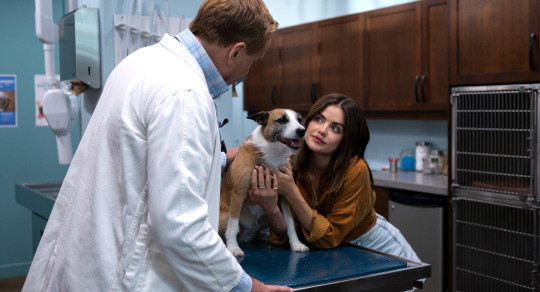
When it comes to romantic comedies, the genre has a tendency to follow a familiar formula: two unlikely individuals are thrown together by chance, their initial interactions are marked by awkwardness and misunderstanding, and eventually, they find their way to each other amidst a flurry of laughter and heartwarming moments. Puppy Love, directed by Nick Fabiano and Richard Alan Reid, attempts to put a unique twist on this tried-and-true formula by introducing the canine factor. While the film brings a fresh element to the genre with its adorable furry co-stars and a premise that has the potential for comedic gold, it struggles to rise above the surface, ultimately leaving viewers with a film that's cute but forgettable.
https://www.youtube.com/watch?v=c4UAK6Jzcrs
The story centers around Nicole Matthews (Lucy Hale) and Max Stevenson (Grant Gustin), two individuals who couldn't be more different from each other. Nicole is a free-spirited, wild-child with a penchant for spontaneity, while Max is a socially-anxious introvert who prefers the company of his furry friend. After a disastrously awkward first date, they both decide to mutually delete each other's contact information and move on with their lives. However, fate has other plans in store for them, as their dogs unexpectedly find a connection, leading to a whirlwind of events that culminate in an unexpected twist: puppies are on the way.
The Good:
The film's initial setup promises an engaging and heartwarming narrative. The idea of two people being thrust into a shared responsibility due to their dogs' unexpected love connection is undeniably charming. Lucy Hale's portrayal of Nicole brings a lively energy to the screen, and Grant Gustin's portrayal of Max captures the essence of an introverted character who gradually learns to step out of his comfort zone. Their contrasting personalities hold potential for great comedic chemistry, yet the execution falls short of expectations.
The saving grace of the film comes in the form of the adorable canine cast members. The puppies steal every scene they're in, their playful antics providing genuine moments of joy. However, even the puppies can't fully compensate for the film's lack of depth and emotional resonance. The supporting cast, including Nore Davis as Sid, offers sporadic moments of comedic relief, but the characters remain largely one-dimensional, serving as mere accessories to the main plot.
Puppy Love also showcases a bright and colorful aesthetic that matches the light-hearted tone of the film. The use of outdoor locations and warm lighting adds to the film's overall charm, providing a pleasant backdrop for the unfolding events. The direction is competent, with the pacing generally maintaining a steady rhythm, but it's not enough to elevate the film beyond its shortcomings.
The Bad:
One of the film's fundamental issues lies in the lack of depth given to the characters and their relationships. While the initial premise sets the stage for personal growth and self-discovery, the character arcs remain disappointingly superficial. Nicole's wild-child persona is never fully explored beyond a few superficial gags, and Max's social anxiety is often played for laughs rather than treated with the sensitivity it deserves. The transition from two strangers forced into co-parenting to potential romantic partners feels rushed and lacks the emotional resonance that would make the audience truly invest in their journey.
Puppy Love also leans heavily on clichés and predictable plot developments. The comedic moments, while occasionally amusing, often feel forced and fall flat due to their reliance on tired gags. The film seems content with playing it safe and sticking to formulaic storytelling, missing the opportunity to take risks and surprise the audience. The potential for a fresh, memorable romantic comedy is present, but the filmmakers appear hesitant to fully embrace it.
Overall:
Puppy Love enters the realm of romantic comedies with a unique premise that promises a fresh take on the genre. However, the film fails to capitalize on its potential, delivering a narrative that feels rushed, shallow, and overly reliant on clichés. While Lucy Hale and Grant Gustin deliver likable performances, their characters are held back by underdeveloped arcs and lackluster chemistry. The canine cast members steal the show with their irresistible charm, but even their presence can't fully salvage a film that struggles to rise above mediocrity. Puppy Love might tug at your heartstrings briefly, but it ultimately leaves you yearning for a more substantial and memorable romantic comedy experience.
Read the full article
0 notes
Text
rei & touya’s relationship is so criminally underrated by canon and fanon imo. people have have pointed out how they look similar, especially when experiencing severe distress or melancholy (which they do look very similar, making their situation(s) all the more sadder), but i also feel a lot of people fail to mention how they are almost… mirror each other, in a sense.
the reason endvr abandoned training touya was because he “inherited rei’s weak constitution”, because he was too much like his mother - not only with the intolerance to heat, but perhaps in personality as well. they have similar reactions when under stress, usually lashing out verbally or sometimes physically. they’re both usually soft-spoken individuals, but also aren’t afraid to speak their minds when need be. they aren’t afraid of getting hurt if it means they deflect or reflect attention from themselves and others (i.e. rei stepping into one of shouto’s training sessions because it was getting too violent, and results in rei getting endvr’s attenttion in a slap. in contrast, touya trained everyday despite the massive amounts of pain it causes to get endvr’s attention.)
they were both the “firsts” in the todoroki family. rei was the first one to take on the todoroki surname as endvr’s wife, and touya was the firstborn todoroki child.
their actions also feel like parallels to each other. they’ve both harmed, or attempted to harm, shouto - but this harm was more-so meant for endvr; these attacks were an extension of the ideals endvr forced onto his family - that only one could be good enough for him.
they both separated from the family in nearly the same amount of time, due to mental breakdowns. they both spent a decade, if not more, away from the family, and then somewhat returned at, once again, nearly the same time. in canon time, it’s only been a year or so since rei and shouto reunited, and perhaps months after touya finally made his grand reveal. it’s kind of funny that this has happened twice - rei leaves, touya leaves. rei returns, touya returns.
and maybe it’s because these two are so similar and so seemingly (and perhaps unknowingly) connected that they don’t know how to help each other, much less themselves. the scene where rei tries to reach out to younger touya really showcases this imo: she almost got through to him, when she asked what he wanted to be. not what endvr wanted him to be; what he, touya, wants.
yet, she loses him when she brings endvr back into the equation - and you can’t fault her for this. her world so quickly and abruptly changed to focus on her husbands rather than her own, when he made her family agree to marry him. the forced marriage and abuse rei suffered from her husband caused her to focus on what she can do for endvr, to focus on him rather than herself. she has to have his children, care for said children, and pay special attention towards the “golden child”. endvr tells rei she needs to “take care of touya”, but not for touya’s sake, for endvr’s sake. because that’s the kind of household endvr has built for years and years. and that’s what causes rei and touya’s interaction to fall apart; because these characters don’t know how to separate themselves from their abuser. it’s a survival tactic; to focus on the needs of the abuser rather than the needs of the victims (including yourself). and neither rei, nor touya, nor any other member of the todofam are at fault for that aside from endvr.
but now, in canon, things are different. rei and touya have been physically separated from endvr for over a decade now, and in terms of mentally/emotionally separating themselves from their abuser, they’ve still got a ways to go. touya’s main goal revolves around killing his father, even if that means touya will die too. rei’s main goal is to bring touya back, and she even encourages endvr to help. while the whole situation regarding what the todofam actually wants to do with touya is still vague, we can see that endvr still has a strong influence over rei and touya.
maybe rei believes endvr can save touya because she couldn’t all those years ago. maybe touya believes he can’t go back to his family and should perish along with endvr instead because, in touya’s mind, he is his father’s ugly, failed creation. something-that-could’ve-been-turned-monster. he’s a reflection of the abuse endvr put both touya and his family through. he even sees himself as his father to an extent, as he’s called his own flames “endvr’s fire”.
they both feel like they can’t do anything for each other because of endvr, when in actuality, i think that rei and touya have always needed each other, and now they need each other more than ever. they had gotten close, back then, with rei asking touya what he wanted to do.
these two characters have so much in common, and their arcs play off of each other’s so well. they can teach each other that they’re not their abuser, and that they’re not what their abuser thinks of them. they are their own person, and it’s time for them to figure out what they truly want going forward.
touya is not his father’s failed creation, he is not weak due to having an intolerance to fire - he’s just touya.
rei is not the hospitalized wife of the #1 hero, she is not a failure of a mother - she’s just rei.
i think the two of them can help each other, and the rest of the family, find healing. they’re so similar, and they should understand each other so well.
basically there’s so much to rei & touya’s relationship that can be explored and analyzed, yet canon (and fanon) seemingly fail to realize this due to the focus on endvr and how He feels rather than… literally anyone else lmao.
there’s still so much about rei & touya’s relationship that we don’t know. but touya does still call rei “mom”, and refers to his father only by name. after all these years, after their brief falling-out before rei was hospitalized, touya still calls her “mother”. that means something.
there’s so much there for rei & touya’s relationship. and it’s a shame that canon and fanon don’t do much with it, or they take what’s been giving to us thus-far at face-value. their relationship has all the seeds planted to make it one that’s complex, caring, healing, and understanding. i just wish canon would actually let it grow instead of focusing on endvr for the millionth time /:
#endeavor /#abuse /#long post#umm. i mightve just got myself into an ambien-induced rant oops#so thisdefinitely doesnt make sense but i love rei and touya so much and ive been thinking abt them all night#uhhhhhh we’ll see how i feel abt this post when i wake up LOL i fr need to sleep bc ambien is um😵💫😵💫😵💫😵💫
224 notes
·
View notes
Text
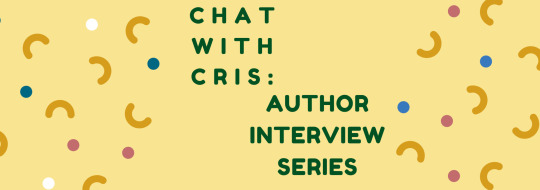
INTERVIEW NO. 1: RACHEL @djarinsbeskar
hello hello! i am so happy to announce that rachel — aka the immense talent that is @djarinsbeskar — has agreed to be my first interviewee for this new series! thank you to rach and to each one of you for all of your support. to read more about the project, click here, and to submit an author, click here.
| why rachel? |
Rachel captured my imagination from the first time we interacted as mutuals-in-law. She’s bursting with energy and vivaciousness, with a current of kindness just underneath everything she does. Her work is no exception. Oftentimes gritty, raw, and exposing (in … ahem…more ways than one), Rachel challenges her readers to dig deeper into both the story and themselves. Her smut brings a particular fire as it’s laced with need, desire, and mutual trust that leads us deeper into the characters’ identities and how physical affection can mimic other forms of intimacy. She’s a tour de force in this fandom and an absolute joy.
| known for |
Engaging with and encouraging other authors, cultivating inspo posts, attention to world building & character development
| my favorites |
Stitches
Boxer!Din
Full Masterlist • Ko-Fi
| q & a |
When did you start writing? What was that project, and what was it like? Has that feeling or process ever changed over time? Why?
I can’t remember a time I wasn’t writing. I was an avid reader, as I think most writers are—and I remember, after picking up Lord of the Rings—that I could live so many lives, experience so many things, all from the pages of a book. I could make sense of the world through words and ink and paper. And it offered me a level of peace and clarity I wanted to share with others. So, I started writing.
My first project I remember to this day, was a short story about a dog. I had been so heartbroken when I learned that dogs were colourblind. I must have been about seven or eight at the time, and I was fixated on this idea that dogs couldn’t see the vibrant hues that made the world beautiful. It was something I wanted to change—and with all the righteous anger of a child not getting their own way, I sulked over the fact that I couldn’t. Until I wrote it down.
“How do dogs see colour?”
And much like my writing today, I answered myself.
“Dogs don’t need to see colour. Dogs smell colour.”
And so, I wrote a story, about a puppy being brought on different walks by its owner. And with every new street it walked down—colour bloomed with scent. Colours more beautiful and vibrant than we could ever hope to see with our eyes. And it gave me solace and helped me work through an emotion that – granted was immature and inconsequential – had affected me. To this day, I still smile seeing dogs sniffing at everything they pass on their walks. Smelling colour. It gave me the key to my favourite thing in life. I don’t think my process has changed much since then. Much of what I write is based on a skeleton plan, but I leave room for characters to speak and feel as they need to. I like to know the starting point and destination of a chapter—but how they get there, that still falls to instinct. I think I’ve found a happy medium of strict planning and winging it that suits me now—and hopefully it will continue to improve over time!
When did you start posting your writing, and on what platform? What gave you the push to do that?
I mean, fanfiction has always been part of my life. I think anyone who was growing up in the late 2000’s and early 2010’s found their way to fanfiction.net at some time or other. The wild west compared to what we have now! My first post was for the Lord of the Rings fandom on fanfiction.net. It was an anthology of the story told through the eyes of the steeds. Bill the Pony, Shadowfax—it was all very innocent. That was probably in 2010 when I was fifteen. I had been wanting to share writing for a long time but was worried about how it would be received. I didn’t really have a gauge on my level or my creativity and – one of the many flaws of someone with crippling perfectionism – I only ever wanted to provide perfection. That was a major inhibitor when I was younger. By wanting it to be perfect, I never posted anything. Until that stupidly cute LOTR fic. It was freeing to write something that no one but me had any interest in, because if I was writing for myself then there was no one to disappoint, right? And that was all it took. I had some pauses over the years between college and life and such, but I’ve never lost that mindset when it comes to posting.
What your favorite work of yours that you have ever written? Why is it your favorite? What is more important to you when considering your own stories for your own enjoyment — characters? fandom? spice? emotional development? the work you’ve put into it? Is that different than what you enjoy reading most in other people’s fics?
I don’t think it’ll come as much of a surprise when I say Stitches. While not original, I mean—it follows the plot of the Mandalorian quite diligently, it is the piece of work I really hold very close to my heart. Din Djarin as a character is what got me back into writing after what must have been five years? He inspired something. His manner, his personality—he resonated with me as a person in a way I hadn’t felt in a long time. And gave me back a creative outlet I had been missing.
It’s funny to say out loud—but I wanted to give him something? I spent so long thinking about his character that half my brain felt like it belonged to him—how he reacted and responded to things etc. and of course, like every dreamy Pisces—I wanted to give him love and happiness. So, Stitches came along. Personally, when writing—it’s a combination of characters, emotional development and spice (I can’t help myself) and when we can follow that development. With Stitches, it’s definitely the spice that is the conduit for development—but I adore showing how the physical can help people who struggle to communicate emotions too complex for words.
I don’t usually read for Din, as most people know—but I do enjoy reading the type of work that Stitches is. Human, damaged—but still with an undercurrent of hope that makes me think of children’s books.
You said, “much like writing today, I answered myself.” Could you talk about that in relation to Stitches?
So, I’m endlessly curious, it has to be said. Especially about why people are the way they are. Why people do A instead of B. Why X person’s immediate thought went to this place instead of that place. And I’m rarely satisfied with superficial explanations. One of the most exciting parts of writing and fanfiction especially, is making sense of that why. There can be countless explanations, some that are content with what is seen on the surface and some that go deep and some that go even deeper still.
Stitches is almost a – very long winded and much too long – answer to the questions I was so intrigued by about Din Djarin, about the Mandalorian and about the Star Wars universe as a whole. I often wondered what happened to people after the Rebellion, the normal people who fought—the people in the background. What did they do next? Did some of them suffer from PTSD? What was the galaxy like right after the Empire fell? That first season of the Mandalorian answered some of those questions, but I wanted to know more. So, I created a reader insert who was a combat medic—and through her, I let myself answer the questions of what happened next.
Regarding Din as a character, I wanted to know what a bounty hunter with a code of honour would do in certain situations—what made him tick, what made hm vulnerable. I wanted to explore the discovery of his identity. Din Djarin didn’t exist after he was taken from Aq Vetina. He became a cog in a very efficient machine of Mandalorians—and it was safe there. I wanted to see what – or who – might encourage him to step into his own. Grogu was that person in a familial sense, but what about romantically? What about individually? There’s so much to explore with this man! So many facets of personality and nuances of character that make him so gorgeous to write and think about.
Talk to me about the Din Djarin Athletic Universe. How does Din as all of these forms of athlete play off who you see him as in canon?
The Athletic Universe! How I adore my athletes. Despite being in a modern setting, I have kept the core of Din’s character in each of them (at least I hope I have!). I like to divide Din’s character into three phases when it comes to canon because he’s not as immovable as people seem to think he is. We discussed this before, how I see Din as a water element—adaptable, but strong enough that he can be as steadfast as rock. But I digress, the first phase is the character we see in the first episode. Basically, before Grogu. There’s an aggressive brutality to Din when we see him bounty hunting. He works on autopilot and isn’t swayed by sob stories or promises. He has the covert but is ultimately separate. Those soft feelings he comes to recognise when he has Grogu are dormant – not non-existent – but they haven’t been nurtured or encouraged. This is the point I extracted Boxer!Din’s personality and story from.
Cyclist!Din on the other hand—is already a father, a biological father to Grogu. And his personality, I took from that moment in the finale of Season two where I believe Din’s transformative arc of character solidified. He was always a father to Grogu, but I do believe that moment where he removes his helmet is the moment, he accepts that role fully in his heart and mind. And that is why I don’t believe for a second, that removing his helmet was him breaking his Creed. In fact, I believe it was the purest act he could do in devotion to his Creed—to his foundling, to his son. The Cyclist!AU is very much the character I see canon Din having should Grogu have stayed with him. This single dad who isn’t quite sure how he got to where he is now—but does anything and everything for his child without thought. It’s a natural instinct for him, and I like exploring those possibilities with Cyclist!Din.
You also said, “he has the covert but is ultimately separate.” What does it take for him — and you — to get to that point of being ‘not separate?’
I mentioned this above, but one of the biggest interests I have in Din as a character is his identity. He’s a Mandalorian, he’s a bounty hunter, he’s the child’s guardian but those are all what he is, not who. I think Din is separate while being part of the covert because he doesn’t know. I don’t think anyone can really be part of something if they don’t know who they are or, they struggle with their identity. It’s curious to me—how you can deceive even yourself to mimic the standard set for the many. In the boxer verse, he identifies himself in relation to his boxing—and every part of his outward personality exhibits those qualities. But when he’s given a softer touch—an outlet of affection, and comfort—we see the softer side of him surface. It’s very much the same with Stitches Din. Identity is like anything, emotions—relationships, bodies. It needs nurturing to thrive, an open door—a safe space. At least, that’s what goes through my mind when I think of him.
Who is your favorite character to read?
Frankie because there are so many ways his character can be interpreted and there are some stellar versions of him that I think of at least once a day. Javi because he reminds me of kintsugi-- golden recovery, broken pottery where the cracks are highlighted with gold. I also adore reading for Boba Fett, Paz Viszla and the clones!
Is there anything else you want your readers to know about you, your writing, or your creative process?
Hmm... only that I am quite literally a gremlin clown who is always here to chat Din, Star Wars, literature, book recs and anything else under the sun! I like to hear people's stories, their opinions etc. it helps me see things from alternative points of view and can truly help the writing process! Other than that, I think I can only thank readers for putting up with my ridiculously long chapters and rambling introspection. Thank you for indulging me always! ❤️
#pedro pascal#din djarin#the mandalorian#the mandalorian x reader#din djarin x reader#din djarin x f!reader#the mandalorian x f!reader#the mandalorian x you#din djarin x you#djarinsbeskar#chat with cris#author interview series#tuserdaniela#userastrid#usernobie#userhai#pedrostories
81 notes
·
View notes
Text
Gojo and Mahito
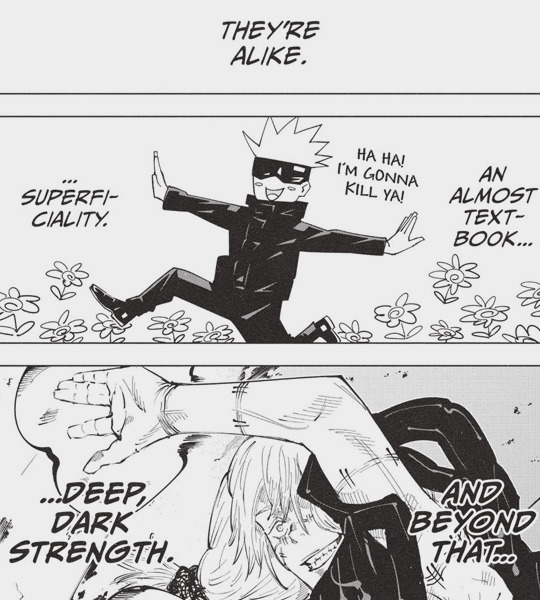
Nanami and Gojo share several parallels as pointed out by Nanami in Chapter 22 of Jujutsu Kaisen. A connection between the two of them that’s developed to the point where we see Mahito steal a technique from Gojo (domain expansion activation for only a few microseconds) in the latest chapter. More on the parallels of Gojo and Mahito, because for both of them there’s more than meets the eye.
1. Children with Too Much Power
Mahito parallels Gojo, but more specifically I believe he has the most in common with teenage Gojo we see in Hidden inventory. Especially on two key points. Both of them had immense strength that they hadn’t quite figured out yet.

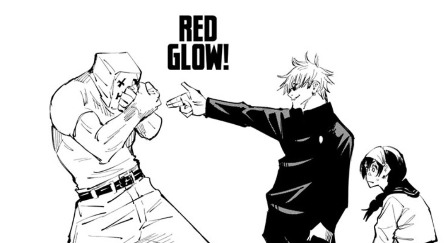
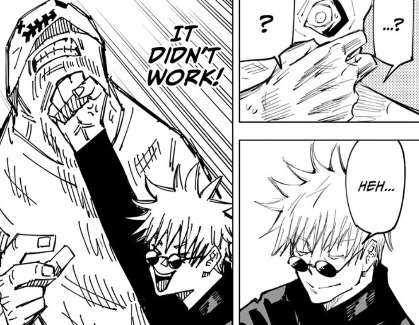
Teenage Gojo, who was still figuring out the infinity and could not yet quite make the universe bend at the snap of his finger tips. In his introductory arc when Mahito was fighting Nanami, he was like a child figuring out how to use his body for the first time.
Everything he does in that arc is out of a childish sense of curiosity. He gets to close to Junpei, to observe what will happen from prolonged interaction with a human. He toys around a long time with fighting Nanami because he’s still figuring out how his curse technique works.
Unlike the other curses who seem to already exist knowing what they are, or have existed for years already long enough to figure themselves out, Mahito is actively learning about himself when he fights Nanami.
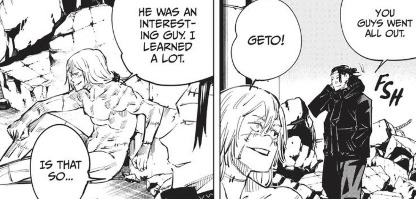
Just like Gojo, being pushed to the brink of death by an incredibly powerful enemy, only seems to make Mahito bounce back stronger. Mahito and Gojo parallel each other in their comparison to Nanami. Simply put, Nanami is the most mature character in the series, he’s the role model for a normal, decent adult.
While Gojo will drag children to battlefields, or take big bets with their lives, Nanami acts much more responsibility, with respect to the fact that Yuji is a child whose emotional well being he’s nurturing.

Nanami is introduced to us as the opposite of Gojo, someone mature while Gojo is immature. He even says that he doesn’t respect him in the least bit. Gojo’s powerful, but he’s not grown up. Nanami even explains this quite logically, people don’t grow up by fighting bad guys, or getting stronger. People grow up by accumulating experiences.

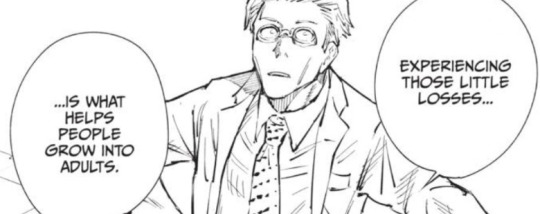
Gojo and Mahito are all powerful in ways that Nanami will never be, while at the same time they act like children. Especially teenage Gojo, but even adult Gojo doesn’t really like to get along well with other people, and decides everything based on his own emtoions and perspective. In other words both Gojo and Mahito have a tendency to be egocentric.
Egocentric.
thinking only of oneself, without regard for the feelings or desires of others; self-centered.
2. The World Through Their Eyes
Mahito and Gojo are characters who appear childish and frivolous on the surface, but if you plunge their depths they have a deeper understanding of themselves and their desires than most ofther characters in the series. They might not get other people, but that’s not their priority either. In classic Jungian symbolism, shallow water belies greater depths.
Gojo and Mahito are both extremely well thought characters, capable of immense amounts of self reflection. (Probably too much self reflection in Gojo’s case, he just loves looking at himself in the mirror a little too much how vain.) It not only shows in how much of themselves they have figured out but also their jujutsu. I think it’s safe to say that there is some resemblance between the infinity, and Mahito’s idle transifguration. Their Jujutsu makes them both privvy to the world that no one else can see. It’s unknown what Gojo can see with the six eyes exactly, but considering the limitless.

You can infer that he’s capable of seeing much greater sensory perception than the normal person. Mahito doesn’t have the six eyes, but because his jujutsu is about altering the form of the soul, he has the unique ability to see the shape of the soul inside of the body.

Mahito can see through people’s bodies, and see down to their souls. However, his perceptiveness has caused him to give up on the idea that people have any individuality at all, that they have “hearts” you know like, thoughts and feelings and stuff. Which is why all humans are pretty much interchangable to him. Mahito can’t see life separate as him from having any particular value.

Both of their cursed techniques create distance between themselves and others. Though in opposite ways. Gojo’s cursed technique is based around the idea that nothing can reach him, because it will always slow down in the infinite space between them. Mahito is able to completely change the shape of whatever he wants with one touch.
However, at the same time this resembles how they both interact with other people. Mahito sees people as nothing more than toys to play with and experiment in developing his jujutsu technique on. He even is literally pictured in an official color illustration as destroying Junpei, Nobara, and Nanami as torn up dolls. They were just toys that he got bored with and threw away.

Gojo can sometimes even share this tendency, not to mercilessly kill and slaughter of course not, but to be so far away from other people, and too busy perceiving the infinity that he can’t get caught up in ordinary lives. Remember, Mahito, Jogo and Hanami’s plan was to shake up Gojo with the sheer amount of people he would have to save in Shibuya, and it just... didn’t work.
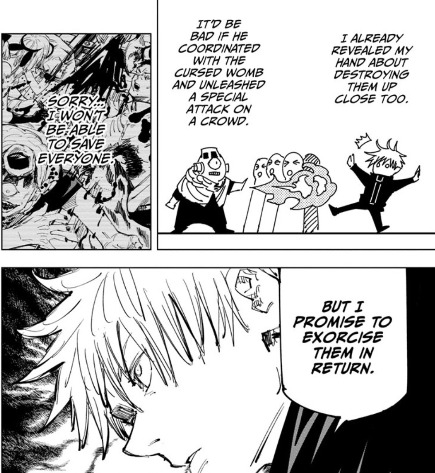
Gojo just isn’t that shaken up by the people he can’t save. He’s not Geto. He’s not Yuji. Of course he cares enough to try and minimize the damage, he could have just used unlimited domain to end the situation at the cost of everybody gathered, but he made a decision to try to balance between everybody’s lives, protecting his own, and exorcising the curses.
Mahito and Gojo are both extremely distant from other people, but because of that they have a unique understanding of themlseves. Mahito’s domain expansion is called “Self Embodiment of Perfection.” When Gojo figures out reverse Jutsushiki he quotes the budha when he reached enlightenment.
They are extremely isolated characters who have others plumbed the depths of themselves. Gojo’s goal is to be the best version of himself he can be, to push himself into being the strongest. Their individual will is so strong they want to impose it on the world around them. Gojo wants to reset the jujutsu world, Mahito wants a world of curses.

They both encourage the other people around them to also think deeper about themselves, and how to evaluate themselves. Gojo tells Mahito to stop repressing himself for the sake of others. To try to be stronger individually instead of more of a team player. Instead of judging those around you, look inwardly.
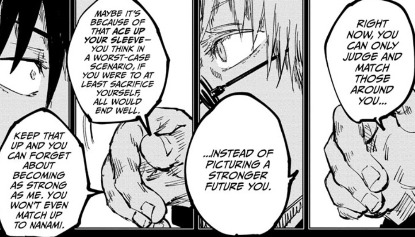
Mahito is furious that Yuji doesn’t evaluate himself, doesn’t think deeply about his own motivations. That’s what he criticizes Yuji for constantly, he doesn’t think for himself, he runs blindly into fights. Mahito calls their fight a clash of truth. Yuji has to know his own self, and know his belifs and know why his beliefs are better than Mahito’s if he wants to face him.
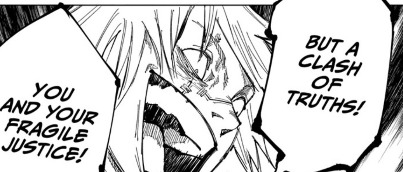
Mahito and Gojo are both always looking inside of themselves, and that’s why their depths go much further than their seemingly shallow surface. If I were to make one last comparison between the two of them, I would say that the reason Mahito imitates Gojo is because his end goal is to become enlightened. What Mahito wants, is to be true to his nature, the truest embodiment of a curse in the series. He wants to reach an enlightenment like Gojo has where he has himself, his role in the world, completely and totally figured out. Where he embodies his own idealized sense of perfection.
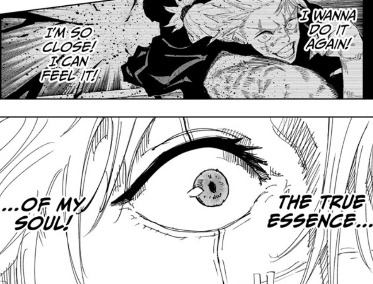
Which is why he imitates Gojo, the strongest. Though his is the opposite path, like a reflection of a mirror. If Gojo uses his power to be the model, the embodiment of a jujutsu sorcerer who exorcises curses to save human lives, then Mahito chooses to be the embodiment of a curse that plagues humans.
Mahito and Gojo both see through things, they can see what everybody else can’t, however they differ in how they use those perceptions. Gojo tethers himself to responsibility to other people, because he finds meaning in doing that, he thinks there’s a point in protecting and nurturing the weak because eventually he’ll be able to find strong comrades. Mahito however, believes in the opposite of camraderie. He can see through other people, so he acts like they’re not even there. Gojo is a character who while his tendency is to try do everything on his own, is currently waiting rescue from the strong comrades he focused so hard into training. While Mahito will most likely end up alone.
#gojo satoru#satoru gojo#gojou satoru#satoru gojou#mahito#jjk meta#jujutsu kaisen meta#jujutsu kaisen analysis#jujutsu kaisen#jujutsu analysis#jujutsu meta
633 notes
·
View notes
Text
ZUTARA - the Trials and Tribulations that come with finding “The One”
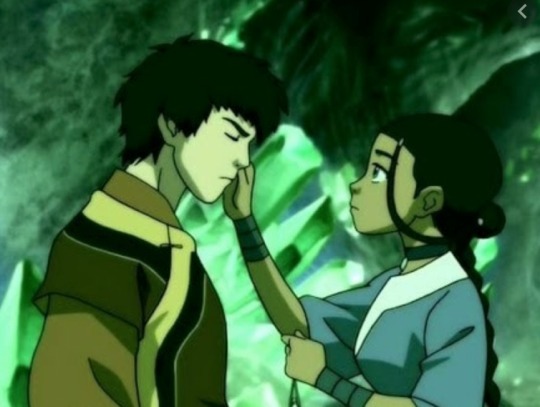
I don’t think it was a coincidence that the two most mature kids in ATLA had various potential “suitors” throughout the show—people they were officially “together” with, people they went on dates with, people they connected with, and people they fell smitten over-- and yet, those feelings would always fall short of that “once-in-a-lifetime” romantic, magical element.
It really made me believe that ATLA was setting up a wonderful example to young viewers about the real-life hardship of finding “true love,” demonstrating that sometimes... it takes a lot of trial and error and experience to eventually get to that person who’s deemed The One.
Zuko and Katara were two characters who had to mature to an outstanding degree in a time of war, and we notice them trying to make connections with people all around them. We also notice how, in spite of the many “potential suitors” they have in their own individual story arcs, the two of them always seemed to “bump into each other” along the way, noticing each other’s character development every single time.
In the show, they build connections with people, but never seem to find someone who carries all that they need for a partner. I could also say that they never find someone who “sees” them in their fullest, complex selves... until it’s the two of them!
Let’s review the suitors for Katara:
1) Haru-- While fans like to speculate that Katara may have had a “thing” for Haru, I personally think she saw him as someone she connected with easily because of his bending ability… in the same way she immediately connected with Aang the moment she found out Aang was a bender. Katara didn’t grow up around other benders, and so it would make sense that she would cherish the idea of bonding with other benders. Haru and Katara had their connection with bending, but it’s pretty clear that Haru’s shy nature and his sensitive personality wasn’t something Katara was looking for in a love interest.
2) Jet-- We do know that Katara falls very smitten with Jet, and here we get to see the kind of person she tends to cling to: someone who’s a strong capable leader, courageous, tall, athletic, someone who makes her feel like she can use her talents and brains, and who supports fighting for justice. Of course, Jet also carries his sense of justice too far with his cruelty and malice, which Katara immediately says she will not support in a partner.
3) Aang-- Yes, we see Katara having a long-term connection with Aang in the show, and this relationship turns from a motherly/child relationship gradually into something that could become a romantic partnership. We also know from the beginning that Aang has deep feelings for Katara, and he tries really hard to get her to see him as a potential boyfriend.
However, there are various “hints” throughout the show that Katara wasn’t completely “taken” with the idea of being with Aang (ie. her behavior in the episode “The Ember Island Players”) and based on what we know about the two characters… there would be problems with their relationship down the road: Katara is a proud meat-eating Watertribe girl and the last Waterbender of the SWT determined to bring back her culture/heritage after the War. Being with Aang-- a proud vegetarian who can’t really handle Watertribe food and customs—might make her have to decide if she is willing to give up part of her heritage for her partner. She would also have to give up her own individual goals in the post-war in order to be at Aang’s side, as his voice of reason. There are many instances in the show where Katara had to be the mature one and set aside her own emotional needs in order to tend to Aang’s needs, and this imbalance would eventually make her realize how she needs a partner who can see her as a complex human being, rather than just a “coddler”… a partner who can be the pillar that she can lean on whenever she needs to let out her emotions and rage.
Now, let’s look at all of Zuko’s suitors:
1) Mai-- With Zuko, we learn he had a childhood crush on a girl, and that crush is returned, but after 3 years being banished… there’s no real evidence that either of them “ached” for the other during that time and distance apart. Zuko and Mai did have their moments together when he returned to the Fire Nation, and while Mai does care about him, the relationship was emotionally lacking, and it’s clear that Zuko cannot be with Mai in his fullest, most open self.
2) Song-- During his time as a fugitive, you begin to see just how self-conscious Zuko is around kids his age. Of course, the last thing on his mind is finding a girlfriend, but he demonstrates how awkward he is as a teenager (and I don’t just mean because he’s a Fire Nation fugitive in Earth Kingdom territory).
When he meets Song, his focus is only to get his Uncle healed, not paying mind to the hospitality this family has given them. He acknowledges Song’s kindness and her family’s suffering because of the Fire Nation, and it emotionally hits him when he finds out she’s been hurt. And yet, despite her being a healer, Zuko doesn’t let Song touch his scar. Zuko isn’t thinking about relationships. He’s on the run with his Uncle and is only thinking about survival. Song wasn’t necessarily a “love interest” for Zuko, but this is the first time we as viewers see a kind, sweet girl try to have a connection with him, and how Zuko—perhaps in any other circumstance—may have developed feelings for her.
3) Jin-- When Zuko and Iroh make it Ba Sing Se, there’s plenty of time to “lay low” without feeling like anyone is after them, and we have another chance at seeing Zuko making a connection with a girl. With Jin, there is a definitely crush from the girl to Zuko, and she doesn’t even acknowledge the boy’s scar. Zuko is awkward, almost uncomfortable trying to be a normal teenager when it’s clear his life has been so different. He still does a sweet gesture to try and make Jin happy (risking his own safety as a Fire Nation fugitive), but it isn’t enough to have Zuko say that he wants to see Jin again after that date. However… we do learn that Zuko likes dating, of having a connection with someone, even if that connection is not meant to last more than one date.
**My personal take with Song and Jin and is that these two girls had that sweet, nurturing, caring trait that Zuko desired, but they still lacked a certain type of passionate, fierce attentiveness that Zuko also needed in a partner to really “reach” him fully as a person.**
So, with all of these potential suitors... why Zutara?
The ironic thing here is that Zuko and Katara had run-ins with each other since the start of the show. They were on opposite sides of the war, fought each other, saw their bending abilities develop more powerfully each time, had a chance to talk and have a mutual connection… and also went on a private mission that nobody else wanted them to do. Zuko and Katara had opportunities throughout the show to really “see” each other as complex characters… but the beautiful thing was that this was all happening *without* any romantic implications.
With their minds preoccupied on bigger things through the war, Zuko and Katara’s interactions were forming the foundation to a life-long understanding and friendship, and... had the show continued… had the two of them finally had a chance to set aside some time in their lives to start dating people in the Post-War… it wouldn’t have surprised me if, one day, they would’ve just exchanged a glance as Fire Lord and Master Katara, and realized… “woah.”
And it really does bring together the dreams and the realities of a good romance: Sometimes it just takes a lot of patience, and time, meeting a lot of “potential suitors,” before you discover the person who’s meant to be The One.
166 notes
·
View notes
Text
The Strength of Selfishness
Each character in BSD has a degree of selfishness or selflessness in themselves, but the way this concept is executed opens discussion on the nuance of “selfishness,” or specifically the flaws in believing selfishness is an inherently bad trait.
Atsushi
Atsushi fits the description of selflessness, but I’d argue that he’s actually more selfish than he thinks he is (keeping in mind that being selfish isn’t necessarily a bad thing).
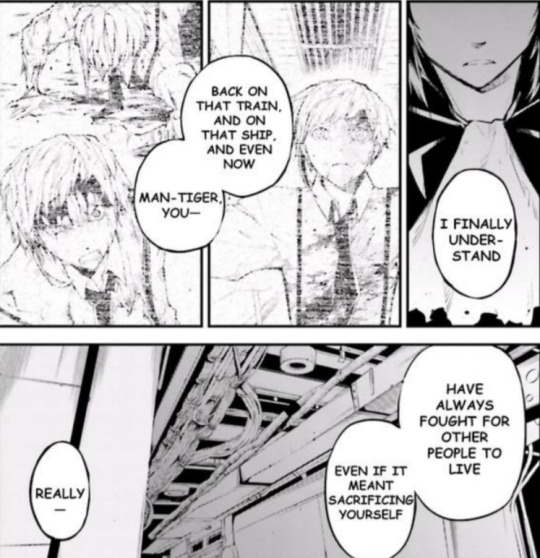
Akutagawa points out how Atsushi will needlessly risk his life in order to protect others, which sounds like a pretty heroic act, but it comes with a cost. Atsushi isn’t invincible, especially at this point in the story when he hasn’t fully mastered his ability, but his insistence on protecting others puts him in constant danger.
At the end of the day, Atsushi would have a greater chance of surviving many of the dangerous situations he puts himself into if he was more selfish by protecting himself before others.
However, Atsushi is also somewhat selfish in his motivations for acting so virtuously.
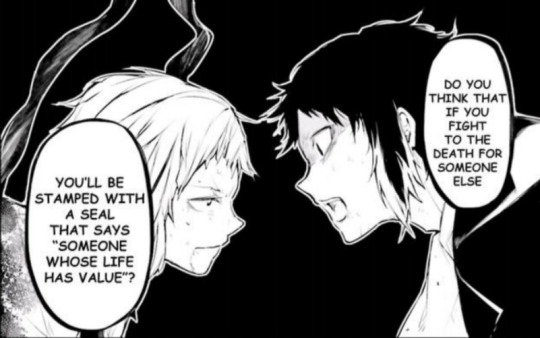
Once again, Akutagawa points out how Atsushi only acts this way because of his deeply rooted belief that he has to risk his life for someone else in order to give his life value. You could argue that Atsushi only saves others as an attempt to prove to himself that he’s worthy, an inherently selfish motive. If Atsushi actually died, he would be endangering the people he could save in the future.
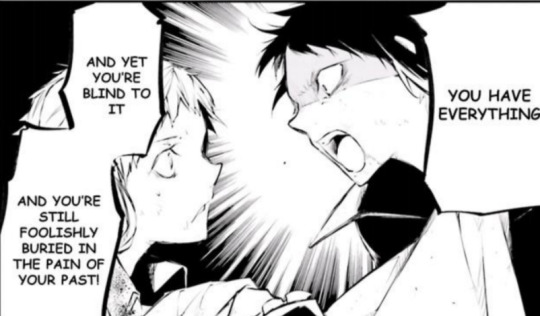
Selfishness also includes self-centeredness. Particularly with Akutagawa, Atsushi’s tendency to focus solely on himself becomes especially noticeable. Atsushi constantly doubts himself and his strengths; he also ignores his privileges and the struggles of others, particularly when he can’t completely understand them — hence why he views Akutagawa so harshly but sees Kyouka and Lucy as people who need to be saved.
Despite all of this, Atsushi still creates a positive impact in other people’s lives. His innately selfish motivation is what drives him to protect others, and he ultimately succeeds in doing that (case in point Kyouka and Lucy again).
Akutagawa
Akutagawa is pretty similar to Atsushi in how his past led to his inevitably selfish motives, but his manifests in a different way.

Akutagawa has to be selfish to protect himself, due to a mix of his past prior to joining the mafia and Dazai’s teachings that collectively reinforced the belief that if he’s weak, he can’t survive.
This results in Akutagawa taking other people’s lives, a direct contrast to how Atsushi saves others, in order to prove his worth as a strong individual that deserves to live. However, this sentiment narrowly crosses the line of hypocrisy when Akutagawa does the very same thing that he criticized Atsushi for: looking for value in his life through other people.
Akutagawa also unnecessarily risks his life in order to prove his strength, which is arguably more dangerous and selfish than what Atsushi does.

When Akutagawa fights Hawthorne, he practically eggs on Hawthorne to kill him, or at the very least fight with the intent to kill. Akutagawa was also injured before entering this fight, so running away would’ve been all the more reasonable than continuing to fight.

Drawing another parallel to Atsushi, Akutagawa has that very same resolve of risking his life unnecessarily to prove his worth.
It’s undeniable that Akutagawa has killed many people — which is arguably extremely selfish — and loss of life really isn’t something that I want to push as morally correct. However, I would like to push the idea of redemption: finding a way to escape this messy lifestyle. I sincerely doubt that the incessant cycle of killing is any good for Akutagawa, or that it’s the life that he wants to have.
With Atsushi and Akutagawa, both of their character arcs will develop accordingly to this balance of selfishness and selflessness.
Ranpo
Ranpo is characterized in a slightly selfish way, but this mindset comes with good reason (relating to Ranpo’s past).
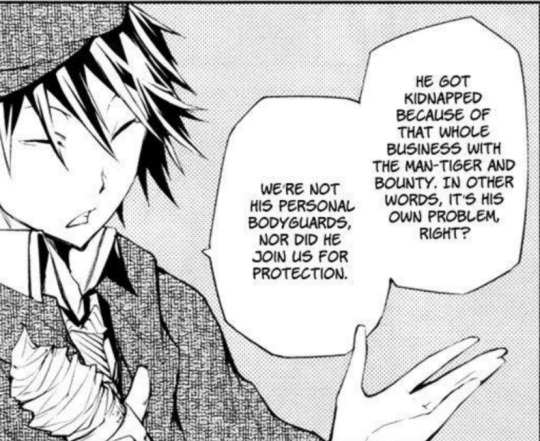
When Atsushi was kidnapped, Ranpo places priority on protecting the agency. If he were to meddle with Atsushi’s problem, which was technically a personal issue, then the agency as an organization would be put at risk. This isn’t necessarily a “wrong” mindset, but it is self-centered.
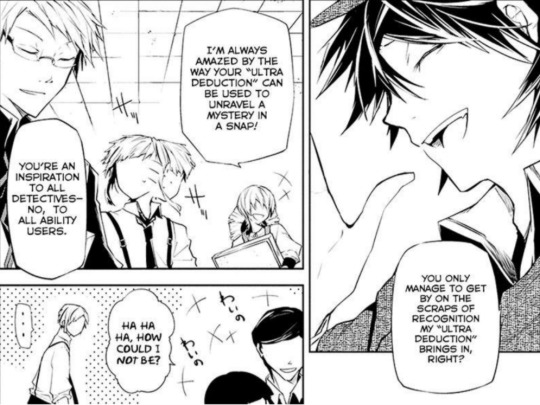
Of course, this is one of many examples to showcase Ranpo’s arrogance, but his arrogance is actually a form of self-protection.
“So his father knew, after all. He understood that Ranpo possessed an extraordinary gift. He knew his son had the special ability to observe, remember, and uncover the truth in the blink of an eye. That was why he sealed it away. He didn’t want Ranpo to go astray, to ever hurt others and make the world his enemy.
His father wanted Ranpo to learn virtue and what’s right just like any ordinary person until he had grown up with good judgment and knowledge.”
— LN 3, “The Untold Origins of the Detective Agency”
Before Ranpo met Fukuzawa, he was just a young, lost boy who didn’t recognize his extraordinary talents. His parents taught him to be modest to allow him to develop as a normal person, but he never truly understood who he was in comparison to other people because he was orphaned at a young age.
Thus, Ranpo had to embrace his superiority, in an albeit dramatic way, in order to accept the world and himself. If he believed that people weren’t as intelligent as him, then he wouldn’t have to hate himself for feeling like an outsider to a world he doesn’t understand.
Similarly to Akutagawa, Ranpo’s selfishness isn’t born out of hatred or negligence for others, it’s simply a survivalist instinct.
Dazai
Dazai’s case is a little trickier to define, but I feel that he’s changed a decent amount throughout the series. I’ve seen some people argue that Dazai only helps others because of Oda’s dying wish, which would make his motivations for doing so inherently selfish. This rings true for Dazai before becoming a part of the agency, but I’d say he’s changed a lot just from interacting with the other agency members.

Dazai’s shown to be capable of the selflessness that involves risking your life for others, but because he’s Dazai, he’s most likely never going to actually die (he has taken necessary precautions to make sure he doesn’t die like in Dead Apple). In this case, Dazai was willing to risk his life for intel from Fyodor, similar to how he got captured by the PM intentionally for intel on Atsushi.
What he says here is especially important: “Certainly, people are sinfully stupid. But what’s so wrong about that?” The Dazai that was once isolated from others, that lacked a sense of direction and purpose in life, has grown one step closer to finding that purpose.
It’s no secret that character to character relationships have a big impact on everyone in BSD, but it’s especially relevant for Dazai who’s growth comes from learning about human nature. He and Fyodor both share a level of super intelligence that ostracizes them from the rest of society, which consequently makes them incapable of understanding other people.
Dazai’s statement here just shows how he’s willing to look past people’s mistakes — yes, they may be sinful and/or stupid, but that’s just a part of human nature.
And in this case, he acts in a stupid way by risking his life for someone else. Yes, it may be stupid, but this selflessness is also a part of being human.
I’d also like to add that Dazai was somewhat selfish in leaving the PM so suddenly after Oda’s death. As an executive, he undoubtedly had some responsibilities to handle, and not to mention Chuuya who was dragged into the mafia because of him in the first place. However, leaving the mafia was ultimately better for his development, and you could argue that the PM is doing just fine with Mori remaining as the leader. Thus, Dazai is another example of how selfishness isn’t harmful in nature.
Mori
On the topic of Mori, he’s a character who outright acknowledges his selflessness as a necessity for the mafia’s advancement.
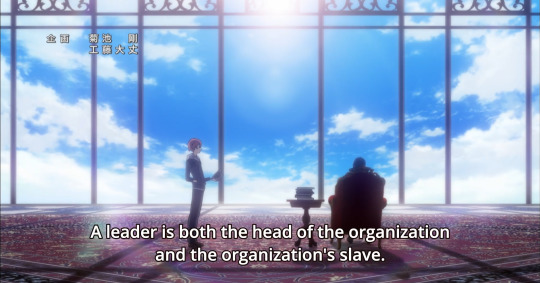


As I mentioned before, selflessness is a stereotypically heroic trait, but it’s flipped around in BSD. You see protagonists with greater selfish convictions than the antagonists, who live their life based on this idea of selflessness.
Of course, just because Mori is an antagonist, this doesn’t mean that selflessness is an innately “evil” trait. In fact, this selflessness is how he grows his organization and gains respect from his subordinates. Mori’s selflessness is used for the benefit of everyone else in the PM (ignoring the obvious crimes that the mafia commits of course).
Oda
Oda is often seen as the role model example for a “good man,” in the world of BSD — which is true to a certain extent. We certainly know how he was selfless in a multitude of scenarios, from saving the orphans at the Dragon’s Head Conflict, to his resolve to not kill anyone, and his push for Dazai to leave the mafia.
However, I’d like to discuss Oda’s selfishness. Oda was well-aware of Dazai’s issues during Dark Era, and he seemed like the only person who would understand Dazai at that level. Despite this, he still chose to die.
“(Dazai) is just a child who’s too smart. Just a crying child who’s been left alone in the darkness, a world of nothingness far emptier than the world we can see.”
— LN 2, “Osamu Dazai and the Dark Era”
Oda is an idealist first and foremost; when reality fails to match his ideals, it becomes unbearable for him to continue living on.
Oda was selfish in his conviction to die, because he knew he could’ve done more for Dazai, but he chose to leave him with a dying wish rather than staying with him to potentially fill that void of loneliness.
(I’d like to mention that Oda wasn’t wrong for his choice, because Dazai ended up on the right path in the end. It was simply an act of selfishness that ended for the better).
Kunikida
Kunikida is an idealist, much like Oda, but he also draws close to being a realist at certain moments.

Kunikida shares the same selfless resolve as Atsushi: to save everyone. His ideals seem unbreakable to the point where he would risk his life and succeed in the end no matter what, purely because he’s just that committed towards his goals.
This treads closely to Atsushi’s selfishness. In this case, for Kunikida, it’s somewhat a part of his self-fulfilling prophecy to make his ideals come true, but he acts selflessly because of these ideals that he believes in.
An important thing to note here is Fyodor’s grin, because Fyodor — as an idealist — is well aware of the fact that the greater the ideals, the loftier these ideals become in reality.
“By that very logic, then Miss Sasaki was not responsible for any of these recent events! She didn’t even want a world in which all criminals are rightly judged! She only— Tell me, Dazai! Was it right for her to die? Is this the ideal world I’ve sought for…”
— LN 1, “Osamu Dazai’s Entrance Exam”
At the end of the Azure Messenger Arc, Kunikida realizes the flaws in his ideals when he fails to uphold them. By trying to save both Rokuzou and Sasaki, he ended up losing the both of them. No matter how hard he tried to save them, there was no possible way for him to achieve the level of “justice” that he desired.
This teaches an incredibly valuable lesson to Kunikida that shifts his mindset towards a more selfish direction.

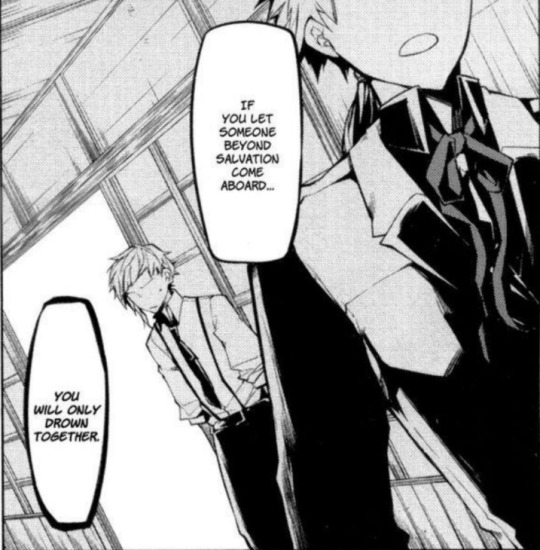
Kunikida’s experience leads him to teach Atsushi, another person strongly motivated by ideals, to not follow the same path as him. You could interpret this as a sign of Kunikida’s declining resolve, but I prefer to view it as another form of self-preservation.
Kunikida very well understands the pain that comes from not meeting his ideals, which could easily affect to Atsushi considering how difficult it would be to save Kyouka.
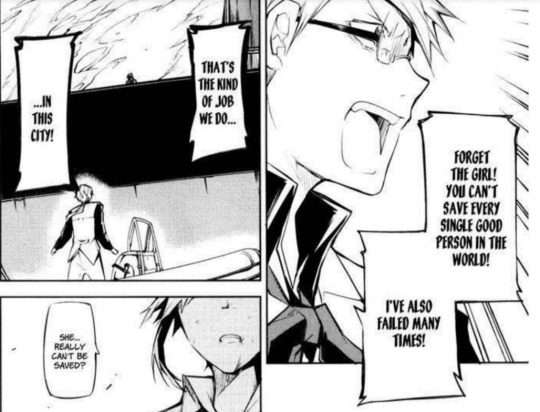
The scene in which Kunikida goes to save Atsushi parallels what Kunikida told him previously: “Your boat can only carry one person. If you let someone beyond salvation come aboard, you will only drown together.”
Notice how Kunikida is in a boat with plenty of space, but out of fear that his ideals won’t be upheld, he’ll lower them to an lesser standard. Instead of trying to save two people, he settles for one, despite the fact that he has the capacity for two.
This instance is a moment of selfishness from Kunikida, an act of self-preservation to prevent the inevitable pain that comes with unmet ideals.
However, Atsushi subverts his expectations by pushing himself to save Kyouka regardless of his sinking boat, because Atsushi’s own ideals motivate him to do so. Kunikida teaches Atsushi to be careful with the balance of selfishness and selflessness; Atsushi teaches Kunikida the beauty in being selfless.
#bsd#bungou stray dogs#bsd meta#bsd atsushi#bsd akutagawa#bsd rampo#bsd dazai#bsd mori#bsd oda#bsd kunikida#idk what an idealist is tbh
284 notes
·
View notes
Photo
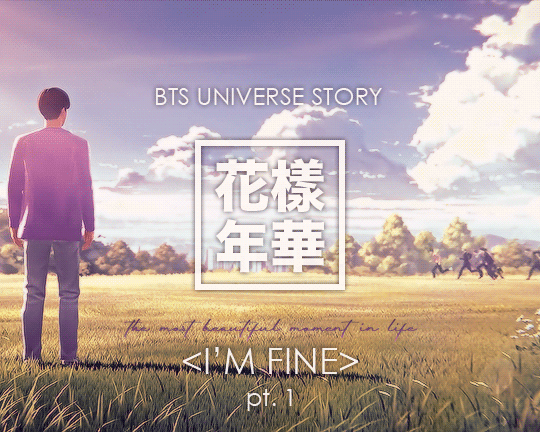
The Most Beautiful Moment in Life <I’M FINE>
BTS Universe Story Highlights, pt. 1 / 4
» pt. 2
Introduction
BTS Universe Story, a mobile game published by Netmarble, was released on September 24, 2020. While the majority of the app is essentially a sandbox and engine for users to create their own interactive stories, it also includes official and canon BU content. The first eight segments were introduced between the release date and December 2020, gathered under the title The Most Beautiful Moment in Life <I’M FINE>.
“I’m Fine” is half of the I’m Fine/Save Me ambigram introduced in the Love Yourself era. Notably, all of the BU content available in the game so far falls between events of the webtoon Save Me (also called HYYH0 in its logo) and The Notes 1—chronologically, that is, while bearing in mind that time resets to the morning of 11 April Year 22 whenever SeokJin fails to avert a tragedy among his six friends. I want to assure anyone who is unable to play the game that you are not missing any new, major plot beats from the overall BU narrative. Instead, the stories provide more insight into the motivations and consequences of SeokJin’s decisions in the earlier time loops, as well as more depth to individual characters and their circumstances.
The goal of this guide is to summarize each of the eight stories and highlight noteworthy details, especially if they are not yet present in other BU media. Within each story (which I often refer to as an arc, due to their character-focused nature), episodes must be played successively, but the stories themselves can be played in any order. I will present them over a series of posts in the order they are listed under the <I’M FINE> heading. The Prologue and NamJoon’s arc are free to play; the rest are paid content. Please note that due to the app’s Terms & Conditions, I will not include in-game footage here. The images in this guide are sourced from the official trailers/videos and the live action MVs as appropriate.
Content warning: contains references to death, suicide, suicidal ideation, child abuse, domestic violence, blood, homicide, depression, trauma, PTSD
This guide contains major spoilers and includes references to other BU media
Do not repost, copy, or quote without permission
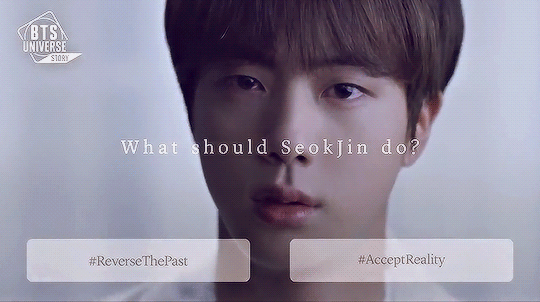
Game Mechanic
Before diving into the summaries, I would like to address the primary mechanic of the game: the user’s control of character choices at designated moments in the stories. It’s a primary marketing point that the player can influence the progression of the narrative, with a frequent in-app tip also declaring, “stories’ endings can vary depending on your choices.” The latter is not strictly true—and it cannot be true due to the structure of the game. Choices are presented within most (not all) episodes, but each episode is an isolated unit: episode 2 provides the same content regardless of what you choose in episode 1. Since the consequences of your decisions are not cumulative, each episode reaches the same ending, and each decision inevitably rejoins the “main” story path (effectively reducing the script size).
So what is the point of this mechanic? While the system is not nearly as complex as what major platform titles are capable of nowadays (I suspect due in large part to the story creation portion of the game), it does foster a sense of interaction with the narrative that isn’t present in static visual media like comics or film. The episodes with choices also have incentive for replay to discover the impact of changing a character’s dialogue or action. Sometimes the differences between the outcomes are inconsequential, but other times you unearth new details, interactions, or memories that are missing in the other path.
I say this partially in reaction to all of the comments and tweets I read for the game trailers and even Smeraldo Book twitter’s choose-your-own-adventure style teasers with The Notes 2 excerpts released last summer. Many users expressed excitement, through words or memes, about finally being able to give the boys the happy ending they deserved. I don’t fault anyone for wanting that happy ending—I wish for it, too. But no matter what the rather overzealous marketing has claimed, I don’t believe that the canon ending of BU is ever meant to be in the audience’s control. But I do feel that this mechanism fits the BU narrative. It echoes the “countless loops” SeokJin has experienced in an effort to save his friends, the choices he must make at every crossroad, and the butterfly effect those actions have on all of their lives. I think it is reasonable to interpret the simple branching paths in the game as alternatives SeokJin has explored across multiple loops in his struggle to find the “right” way forward. I’d love to hear if you have theories of your own!
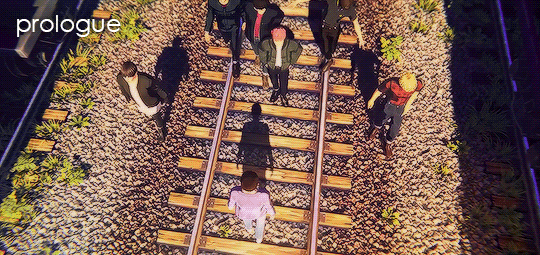
Prologue
The prologue is a brief episode introducing SeokJin’s repeated struggle and failure to save his friends. He wakes up yet again in his bed on 11 April Year 22, the beginning of the time loop. After reflecting on the tragedies that keep befalling the others, SeokJin realizes that he has only tried to fix the problems he can see. He wonders: “Have I tried to understand the root of my friends’ misfortunes? How much do I really know about my friends? Maybe I was never brave enough to confront their real scars and the worlds they’ve been living in. But I need to do it. Because it may be the key to saving them all.”
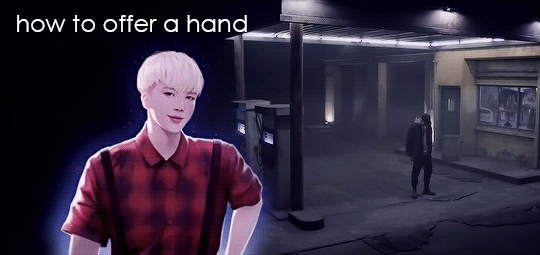
How to Offer a Hand
In this story, SeokJin attempts to prevent NamJoon’s arrest after he gets in a fight with a rude customer at Naeri Gas Station, his place of work. The first episode opens on the night of 11 April Year 22 with NamJoon curling his fists, glaring as crumpled bills lie untouched on the pavement. (The money looks similar to the shot from the I Need U MV.) SeokJin reaches for his shoulder, but NamJoon shrugs him off and strides away to punch the customer who deliberately dropped the bills for him to pick up. The gas station owner runs over at the customer’s furious shouts and orders NamJoon to apologize. He refuses, and police officers soon arrive and charge him with assault. No one listens to SeokJin’s protests that the customer started it first. The man sneers as NamJoon enters the police car. “Do you even have money for a settlement? Hey, you’re done for.” NamJoon is sentenced to prison again, and SeokJin hears glass shattering before the loop resets.
Rising from his bed on the morning of 11 April, SeokJin reflects on his failed efforts so far. He has hit the customer’s car, called for NamJoon in the middle of the incident, and stopped the fight himself, the latter of which caused his friends to avoid him later. The fight has even escalated; the details are unspecified, but the audience is provided an ominous shot of SeokJin speaking to a police officer alone at the scene. NamJoon is not the kind of person who would normally respond to that kind of provocation with his fists. SeokJin realizes that he cannot merely stop the fight but must discover and fix the true cause of it.
With this in mind, SeokJin heads to Naeri Gas Station during the day and tries to engage NamJoon. This is their first time meeting since they both returned to Songju, although SeokJin has experienced it in many loops already. “It’s been a while,” he greets (as he does at the end of the Blood Sweat & Tears Japanese version MV). Before SeokJin can dig deeper in their conversation, NamJoon is called away by his boss. SeokJin enters the small employee break room which serves as NamJoon’s living space when he’s not at the container, hoping to find some clues about his friend’s life. SeokJin locates something bundled in newspapers. If the player chooses to open it, he sees a strange shard of glass inside that may belong to a car or motorcycle headlight. He continues on, finding the book Cosmos by Carl Sagan and a notebook. SeokJin hesitates over the invasion of privacy but decides to read it since he needs all the information that he can gather. The journal entries detail NamJoon’s daily life since returning to Songju: his work at the gas station isn’t too bad despite the occasional rude customer; he purchased a book and hopes to get more in the future; he picked up a second job at a wedding hall to help catch up on bills; his brother NamHyeon got in trouble again, leading to more expenses; and his dad’s health has worsened, with hospital bills after an emergency surgery rising to levels that the family cannot afford. SeokJin knew that NamJoon was the de facto head of household due to his father’s illness but was unaware that it was to this degree. He feels sorry for NamJoon yet is also impressed by his maturity, for NamJoon never writes how difficult his situation is.
NamJoon arrives and asks what SeokJin is doing in the room. If the player chooses to answer “reading” instead of “just sitting there,” SeokJin privately observes that the conversation flows more easily when they talk about books. NamJoon says he must leave and declines when SeokJin offers to wait for him there. SeokJin knocks over a pile of books along with money and receipts as he stands. He thinks it is unusual that NamJoon picks up the books before the money. The books seem to be more than a hobby to NamJoon, holding special meaning. Walking to his car, SeokJin wonders if it is pride or determination not to falter that keeps NamJoon from journaling his grievances. He realizes that money is a constant source of frustration and misery to NamJoon, and that’s why he can’t stomach being insulted over the customer’s dropped money. SeokJin’s new plan is to prevent NamJoon from picking up the money. He also calls Palgok County Hospital and offers to pay the patient bill for NamJoon’s father. Anticipating that NamJoon will be angry if he finds out, SeokJin says the payer is Songho Foundation.
That night, SeokJin returns to the gas station with the excuse that he forgot to fill up earlier. The luxury car arrives with a honk, and NamJoon hurries over to assist. He shakes with anger when the customer drops the money on the ground. “Why aren’t you picking it up? You don’t want it? What’s with that look? Pretty arrogant for a part-timer, aren’t you?” goads the customer. SeokJin intervenes. Whether the player chooses to have him advise NamJoon not to pick it up or to order the customer to pick it up himself, the end result is the same. SeokJin asks the customer, “Why are you harassing a pitiful part-timer?” The customer drives away, and something about NamJoon seems off. His face is expressionless, not mad or humiliated. “SeokJin, you…” He stops. “Never mind. Thank you for your help.” The words sound difficult for him to speak.
SeokJin believes that he has saved NamJoon, although this ending feels sloppy. He continues on in the loop to rescue JungKook and later YoonGi, but uneasiness plagues him. Though he meant to help NamJoon with his actions, SeokJin wonders if he hurt him instead. On 5 May Year 22, he returns to the gas station and follows NamJoon when he leaves work early. NamJoon enters a bookstore, and SeokJin sneaks in after him to watch from afar. He overhears employees talking about NamJoon, worrying that he might dirty the pages of the book he’s perusing. NamJoon is too absorbed in the book to notice one of them calling for his attention. SeokJin recalls a memory from their school days when he found NamJoon reading alone in their classroom hideout: he asked why NamJoon read so diligently, and his friend explained that he found it comforting to empty his thoughts of everything else while focused on the book. In the present, SeokJin wonders how he forgot how much books mean to NamJoon. He sacrifices some of his food and transportation budget to afford them, but they enable him “to endure the weight of the world he’s forced to bear on his shoulders.” After realizing this, SeokJin wants to apologize for carelessly sympathizing with the reality that NamJoon has weathered alone.
The next episode is from NamJoon’s perspective, revealing his excitement over being able to purchase a book for the first time in two months. He wants to buy two but can only afford one. The employee at the register sighs and asks why he leafed through a book he wasn’t going to buy. NamJoon apologizes, and she mutters, “So dirty.” He notices his reflection, clothes worn and smelling of gasoline, and realizes she’s talking about him, not the book. He tries to shake off these depressing thoughts, but he is still not accustomed to this treatment despite experiencing it regularly at work. As NamJoon begins to exit the store, the security alarm goes off. The employees demand to check his bag despite his insistence that he didn’t steal anything. Their certainty of his theft angers him. NamJoon allows them to look through his bag, and they are suspicious of the like-new book in it which he brought from home. One begins to call the police until SeokJin appears, vouching for NamJoon by saying he saw everything. The employees accept that the alarm malfunctioned and excuse their suspicions as a mistake.
Outside, SeokJin asks NamJoon if he is all right. NamJoon is thankful but wonders how SeokJin materialized right when he needed him. “How’d you find me here?” he asks aloud. SeokJin explains that he happened to notice him while walking through the neighborhood. NamJoon wonders if it’s because they said goodbye on a weird note last time. He thanks him and turns to leave. SeokJin calls after him. “I’m sorry. I wanted to apologize. I didn’t mean to upset you that day at the gas station. It was a mistake to have called you pitiful. If my rash actions hurt you, I’m really sorry.” NamJoon accepts his apology, believing it to be sincere, and says that things would have turned out a lot worse if SeokJin had not intervened. Thunder rolls overhead, and NamJoon uses the impending rain as his excuse to depart. He declines SeokJin’s offer of a ride and runs home, feeling his friend’s eyes on him.
Before he can settle down to read at home, NamJoon receives a call from his cheerful mother. She thanks him for paying off the entire hospital bill. NamJoon is perplexed and asks what’s on the receipt, since he didn’t pay it. His mother wants to leave it be, but he insists that they investigate so they don’t get in trouble or sued. She reads that the Songho Foundation is credited as the payer. NamJoon calls the hospital, introducing himself as the guardian for Kim YoungMin, but they can’t transfer him to the administrative department at this time. Disappointed, he looks up the foundation’s website, unable to recall why it sounds familiar. He wonders why a scholarship foundation in the city would get involved with him. Spotting photos of a recent launch ceremony on the site, he recognizes a few people: Songju High School’s principal, the familiar-looking face of the foundation’s chairman, and SeokJin. First, NamJoon forces a laugh, and then it’s difficult for him to breathe. He thinks that SeokJin really had pitied him at that moment. The only thing keeping NamJoon going is the idea of getting through life on his own strength. Why does he have to live like this?
The last episode opens on 5 May back in SeokJin’s perspective. He is confident now that he has saved NamJoon, although it occurs to him that a better alternative may have been to simply pick up the money himself instead of stepping forward. (This decision is enacted in a later loop and depicted in the Euphoria MV.) While reflecting on what comes next to save his other friends, he receives a text from NamJoon. “What’s your account number? I’ll pay you back for the hospital bills. I don’t need your help. I’ll handle my concerns on my own.” Heart sinking, SeokJin wonders how he found out. With a sense of foreboding, he tries calling NamJoon, but no one answers. SeokJin texts him back, pretending that he doesn’t understand, and tells NamJoon to call him. SeokJin’s second attempt connects while he’s gathering his car keys to visit the container. “That’s enough. Just send the account number over text,” NamJoon instructs. SeokJin coaxes him to talk for a moment, and NamJoon asks flatly, “Are you going to apologize again?” SeokJin attempts to salvage the situation, but his friend turns cold when he insists that NamJoon is misunderstanding and that he just wanted to help. “So, why? Why are you helping me?! Yeah, you’re always a good person. You’ve done nothing wrong and I’m the one misunderstanding.” SeokJin apologizes again. NamJoon refuses his request to meet in person. “No, I thought maybe there was a reason for everything you did… But I guess I misconstrued it. I’ll pay you back, so I’d prefer if you stopped contacting me.” Long after the call ends, SeokJin stands holding his phone, feeling that the glass is going to break at any moment. He wants to believe that it’s not over, but hope is slipping through his fingertips.
The episode finishes in NamJoon’s perspective. On 8 May and 9 May, he accepts part-time delivery work and reflects on his three jobs. Whenever he thinks he’s at his breaking point, he focuses on his new goal of returning SeokJin’s money. On 10 May, NamJoon wakes up to his buzzing phone and is called in to work. On a scooter, he passes by a bus stop and notices graffiti. (This is the same bus stop, with matching graffiti, that appears in the Highlight Reel.) Mesmerized, he wonders if it’s TaeHyung’s. As soon as NamJoon looks up, the scooter’s brake fails, and he crashes. The shattered glass on the cold pavement reminds him of the headlight shard and the kid who looked like TaeHyung. (So the piece of glass SeokJin saw in April was really a memento NamJoon retrieved from the scene of the crash in the mountain town, where the delivery boy whom he privately called TaeHyung died. This event is described in NamJoon’s 17 December Year 21 entry in The Notes 1.) NamJoon’s vision grows blurry, and the distant sound of an ambulance doesn’t come any closer.
The arc concludes there, but it obviously marks another reset for SeokJin. It is interesting to note that in this failed loop, NamJoon suffers the same fate that he narrowly avoided in the snowy mountain town before returning to Songju.
Please stay tuned for the next Highlights post featuring JungKook and YoonGi!
#armiesnet#networkbangtan#bangtanarmynet#armysource#dailybangtan#bts universe#hyyh#bangtan universe#bts universe story#bts universe story highlights#seokjin#namjoon#namjin#bts theories
153 notes
·
View notes
Text
The difference between the friend dynamics in the Adventure and 02 groups
This is a point I’ve reiterated in a lot of my 02-based metas, but there is a fairly distinct difference between the Adventure Chosen Children having a tight, deep bond and yet not quite being friends in “social life”, whereas the 02 group was a much tighter group on a social level. I always feel that I need to be really careful about saying this, because if I don’t word it carefully, it sounds like I’m trivializing the Adventure group’s bonds (plus, a lot of Adventure diehards will get very upset at you for suggesting this no matter how you put it), so I thought I should write something a bit more in-depth about it.
I think a lot of of this ultimately ties into what each series was about. The fact that Adventure was meant to be a series about “self-recognition of the individual” whereas 02 was about “relationships with others” has been pointed out by many a fan (and official staff too, while we’re at it), and it naturally lends to how the characters and the relationships between them will have a fundamental difference.
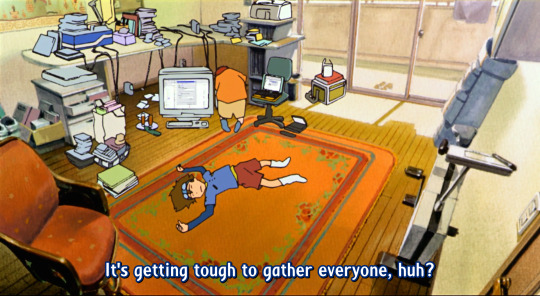

The idea that the Adventure group wouldn’t be the type to get together all that easily never really took that long after Adventure to set in. Of course, Our War Game! having this as a plot point also had a meta purpose (basically, limiting the number of people who could participate in the Diablomon battle), but it also has a very important point behind it: the Adventure kids’ social lives were never all that intertwined.
Again, this is something that sounds really awful to say without further qualification. What do you mean, the Adventure kids weren’t friends? Does that mean their entire adventure was for nothing? Did they go through all that only to forget about each other right after it?!
Well, no, that’s kind of exaggeration. I think to properly flesh out the nature of the issue, it’s important to define the differing ways you can be friends with someone. Imagine that you go on the best vacation in your life. You meet a handful of people there. You swap stories and get life-changing advice. You take commemorative photos after some really spectacular experiences. You swap numbers and social media contacts and then you go home. Are you going to keep in touch every so often with the people who gave you some very important advice, and maybe check on their important life events or organize a reunion sometime in the future? Very possibly! Does that mean everyone you met at that trip will now be regularly going out for lunch with you every week now?...Probably not, especially if you already have friends from school. That doesn’t mean you aren’t friends with the important people you met during that best life-changing vacation; it just means that they fill a very different niche in your life from the friends who don’t necessarily understand the life-changing vacation but have the free time to chat with you over lunch.
When the Adventure group found themselves pulled into the Digital World during summer camp, they had already come from very different social spheres. In short:
Taichi, Sora, and Koushirou were the only ones with a background of knowing each other beforehand, thanks to being in the soccer club;
Yamato went to the same school as the others but was a stranger to them, to the point people didn’t even realize Takeru was his brother at first;
Mimi had her own friend circle (see Adventure episode 29);
Jou was assigned as Mimi’s camp group leader but had no other prior relation to her, and Yamato didn’t even initially know his age;
Takeru wasn’t even supposed to be there since he didn’t go to their school and was only tagging along with Yamato;
Hikari was brought halfway into the adventure by virtue of being the eighth Chosen and Taichi’s sister.
Although six of the eight come from the same school, you can see that they’re basically “kids brought together by a certain circumstance” -- they’re not kids who would have normally come into each other’s purview had it not been for this. Which also means that as soon as their adventure ended and some years passed, the aspects of their real lives and social circles started kicking back in:
Taichi continued soccer;
Yamato formed a band (and presumably had a good relationship with his own bandmates);
Sora quit soccer for tennis;
Koushirou quit soccer for the computer club;
Mimi moved to the US;
Jou started attending a private school outside Odaiba;
Takeru and Hikari were never in their age group to begin with.
In the case of Taichi, Yamato, Sora, and Koushirou, it’s representative of how, although they originally had a shared interest in soccer, ultimately, they started to drift into their own specialties. Again, remember that Adventure was a series fundamentally about finding yourself and finding your own path, and all of these choices actually tie into their character arcs: Taichi is a straightforward person and a natural, charismatic leader, meaning soccer was good for him to begin with; Yamato learned to become more sociable and make friends at school; Sora started playing tennis as part of properly reconciling with her mother, and Koushirou decided to pursue a club relevant to his actual interests instead of one purely so that he could have minimal presence in it.
Mimi’s moving to the US is an interesting case because it’s likely because she’s often described (by both fans and official staff) as someone who is easily likeable and can get along with practically anyone. Considering that she’s constantly considerate of others and lacking in condescension or malice, it’s easy to see why; her infamous bouts of complaining were largely because she was under a lot of stress at the time of Adventure’s events (it’s even said that her cracking under pressure was meant to be representative of how an ordinary child her age would react to the situation), and otherwise she has no problems making friends -- hence why she was shown in Adventure episode 29 as already having friends in Taako and Mii-chan that she presumably hung out with prior to the events of the series. So in moving to the US, the point is made that Mimi could move to an entire other country and still hit it up with people there (and she does, given how she makes friends in Michael and the other American Chosen without issue). So thus, Mimi’s moving is also part of her own path -- becoming an effective “ambassador” between international Chosen as they start to pop up all over the globe.
As for Jou, his character arc has heavily to do with the fact that he’s always been on the “elite” academic track -- Japanese school entrance exams stretch back as far as high school, so the fight to get into medical school comes back as early as here, and since the events of Adventure helped Jou come to terms with why he wanted to be a doctor rather than just following his father’s wishes, it’s understandable that he would now be putting everything into that goal -- even if it means going to a different school outside Odaiba and committing himself to the prep school life. And, generally speaking, the other kids respect that too, given that the only time they tried to pull him from it was a time they were literally suffocating on the spot and needed Ikkakumon’s specific backup badly (02 episode 16).
And finally, Takeru and Hikari? The fact that they’re that much younger than the others in this group really is a big deal. When they’re on something “purpose-based” like an adventure, of course the others will have no problem keeping them around, and of course they’ll be happy to participate with these older kids. But if we’re talking about mundane, ordinary life -- there’s not a lot of evidence to suggest they really would prefer the company of kids so much older than them for conversations over lunch. This is especially because it’s hard to imagine they didn’t have other friends at school, too.

Not that they mind being around all these older kids when the time calls for it, but as far as socialization goes, they have their own lives to live. And that’s fine; again, Adventure was a narrative about kids coming to terms with themselves and what they wanted, and it’s not their fault for prioritizing those paths and forming their own social circles rather than insisting on being a specific eight-person group (no matter how much the fanbase wants to have the romantic image of them sticking together all the time no matter what).
Plus, it’s not like they all completely drifted apart and cut each other off!

Just because they’re not “daily life friends” doesn’t mean they’re not still important to each other. 02 episode 38 has Taichi, Sora, Jou, and Koushirou show up for Yamato’s concert -- it’s unlikely they were attending every single one of his concerts, but this was a very important one that was going to be broadcast on TV, so it’s only natural that even Jou (who, again, doesn’t go to school in Odaiba anymore) would still come to support him.
In fact, the fact they can come together when a situation like this happens even without necessarily meeting up every single day of their lives is probably a testament to how strong that bond is in itself. They don’t need to hang out once a day or week to maintain their friendship, and having other friends they’d rather hang out with throughout the day or invite to events doesn’t necessarily mean the other Adventure kids are less worthy friends to them. That experience in August 1999 was so impactful on all of them that they will never forget it, so even if they spent quite a long amount of time not interacting with each other, when a circumstance that necessitates them coming together does bring them together, they can hit it off like nothing happened. Think about how you might have an important friend that you may not chat with on a daily basis, but you talk to them once in a while and hit it off like you never had a break in the conversation. But because that strong bond is based on that one very specific experience that happened in one specific summer, it’s only natural that the majority of meetups over this are going to be based on something to do with that experience, like Digimon incidents; for ordinary things like “band concerts” or “club activities”, it’ll naturally be easier to stick around friends who have more similar social interests, like fellow band or club members.
On the other hand, this is very much not the case for the 02 group.
To understand why the 02 group has a fundamentally different dynamic, we need to dial back to a little before the actual “adventure” part of 02 started.
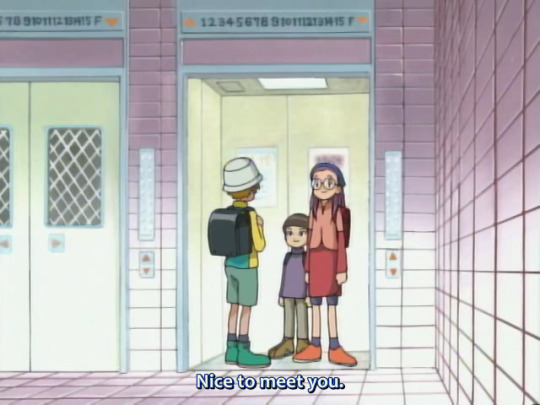
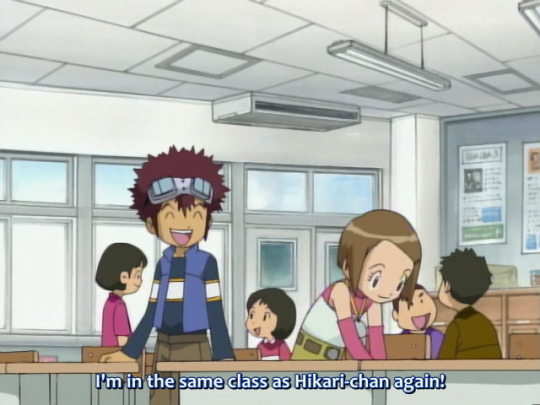
Right off the bat, we see:
Takeru moves to Odaiba from Sangenjaya, and specifically to the same building Miyako and Iori live in, meaning he’ll be walking to school with them every day;
02 episode 7 indicates that the Motomiya and Yagami families live in the same apartment complex, meaning Daisuke and Hikari are also likely to walk to school together;
Miyako and Iori are established as having already long hit it off with each other as neighbors;
Daisuke, Hikari, and Takeru end up in the same class (with Daisuke and Hikari having known each other already).
In other words: Even before anything to do with Digimon had been introduced (or re-introduced, technically) into their lives, the kids were already being thrown into each other’s social circles. You could technically argue that Daisuke wouldn’t have necessarily met Miyako and Iori if not for the Digimon incident coming into his life later in the episode, but Takeru being neighbors with them basically fills in all of the gaps here -- unlike with the Adventure kids where the adventure in August 1999 threw them together when they likely wouldn’t have been in the same social circle otherwise, the 02 kids are the social circle even independently of the Digimon incidents. In fact, due to being functionally neighbors, there are a lot of ways these kids’ social lives intersect, with Daisuke and Miyako being Taichi and Koushirou’s juniors, Miyako working for Yamato’s band, Yamato being classmates with Miyako’s sister Chizuru, and Jun and Miyako’s other sister Momoe being classmates.
Since, again, 02 was a series fundamentally structured on examining relationships, you can basically view Adventure being a series about “bringing some people together as they find self-assertion even when they’re from different social circles” while 02 follows that up with “so if they were in the same social circle, how would they deal with that?” -- especially since 02 makes it clear that certain kinds of emotional baggage associated with that can actually make it much more complicated.
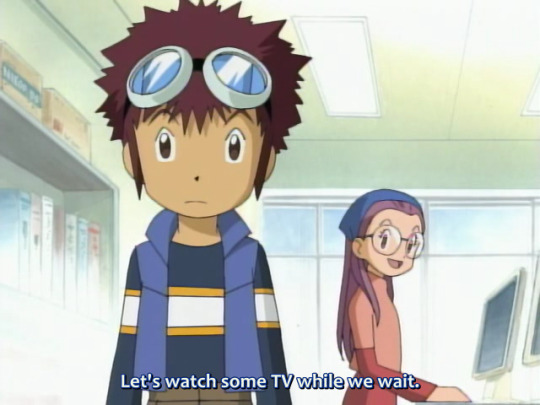

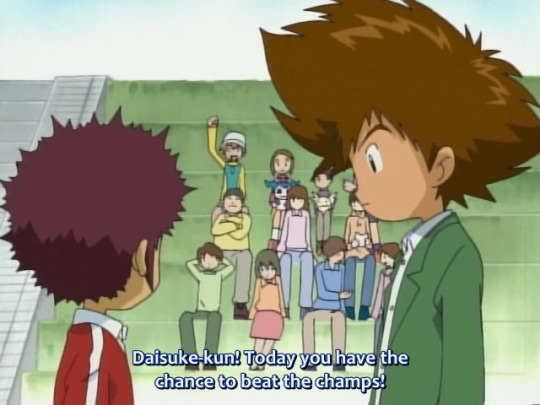
A lot of 02′s first half is dedicated to the 02 kids doing completely mundane things that have very little relevance to the Digital World conflict -- watching TV in the computer room (remember: this was before they realized the “genius boy” being covered on the news was actually relevant to this), or having a picnic in the Digital World. Mimi even explicitly points out that this kind of thing wouldn’t have happened with the Adventure kids, but it’s not just because of the fact that Adventure involved a lot of running for their lives! It’s easy to dismiss a lot of what happens in these early episodes as “filler”, but a lot of this is dedicated to depicting how the 02 kids were constantly spending time with each other for reasons completely separated from Digimon incidents. This even includes completely ordinary things like soccer games -- Takeru, Hikari, Miyako, and Iori come to support Daisuke with an obvious motive of seeing him do well, so it’s apparent that they’ve come to enjoy hanging out with him beyond just obligation.
Part of this is because of the different nature of the Digimon conflict that they experienced. The Adventure kids had an experience that really was, functionally, “one” experience -- an extremely formative and important one, but one condensed one that they all experienced together. The nature of what the 02 territory war and conflict was, on the other hand, meant that what the conflict “was” to the 02 kids was of a completely different nature. This wasn’t summer vacation; this involved going back and forth between the fight and real life, to the point where Digimon fighting became integrated into “daily life” -- so of course you’d probably hope that the people you’re fighting with are also people you like to bond with on a social level. “Digimon life” and “social life” became synonymous to them.
And when it all comes down to it, it’s hard to pinpoint a “single experience” that the events of 02 embodied, or at least in the same way August 1999′s adventure was. As much as they were running for their lives, the Adventure kids have the luxury of looking at the events of their series as a formative singular time for them, one that they could even look at nostalgically, but for the 02 kids, it’s hard to condense everything into one singular experience (it’s easy for the audience to see it as one series, but for the kids themselves, it’s a very long chain of vaguely connected events). Actually, most of the year involved fighting with someone who ended up becoming their important friend and the other involved helping him deal with his trauma, so it’s not like everyone would be likely to have the most romantic image of this experience itself to “bond” over as much as they care more about the take-home they got out of it: each other.

One thing that 02 doesn’t really spotlight front and center with its starter cast of characters is that, unlike the Adventure kids, who either came with their own social circles prior to Adventure or eventually developed their own in the course of their lives, it’s heavily implied that the 02 kids actually had difficulty making other friends even on a social level, or at least were likely to be in a situation where the other 02 kids really were better company than their other options even for mundane situations. This is especially in the case of the newly introduced characters, who are, effectively, a bit socially “displaced” from others and likely to have struggles fitting in.
There are quite a few signs that Daisuke had serious difficulty making friends prior to the events of the series (with Hikari being the closest thing he had to one), and the fact that the 12-year-old Miyako is portrayed as constantly hanging out with the 9-year-old Iori, brought together by being neighbors, rather than people closer to their own ages stands out. Iori is particularly interesting in that, unlike with Takeru and Hikari, who were portrayed as kids likely to socialize better with those their own age, Iori’s unusual maturity for his age heavily implies that he would actually be out of place with his classroom peers (a very common phenomenon for some people in real life, too!). 02 episode 3 depicting him left alone in the classroom with only a teacher to watch him while his stubborn fixation on principles leaves him slow to finish his lunch says a lot -- his own behavior is liable to isolate him from others, and it’s thus not all that surprising he ended up bonding with some kids who are older than him and more accepting (and even treat him with proper respect, too).
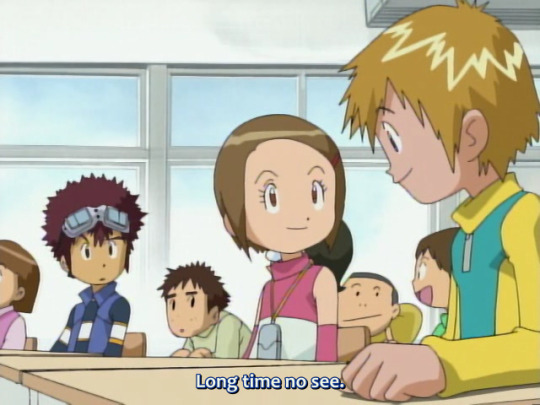
Takeru and Hikari, too. There’s been a lot of arguments over whether the two of them would theoretically be closer to the Adventure kids or the 02 kids, but I would honestly say it’s technically both at once -- they have the same “not socially close, but intuitively understanding” relationship that the Adventure kids all have with each other, but hold the other 02 kids as part of their social circle and hang out with them in “daily life”. So in other words, they have the Adventure kids’ relationship with the other Adventure kids, and the 02 kids’ relationship with the 02 kids. This is presumably why Takeru and Hikari end up hitting it off so well at the start of 02 even though they didn’t interact all that intimately in Adventure; not only do they have that shared experience they intuitively understand, they also were able to start hanging out in day-to-day life and actually, well, socialize.
This applies to them in relation to the rest of the group as well. While neither of them were necessarily portrayed as having social problems, one common thread between the two is that they’re both very emotionally closed-in. Takeru’s response to negativity is to cover it up with smiles, until he can’t hide it anymore and bursts (which scares the hell out of Iori in 02 episode 19 and ultimately forms the basis of their Jogress arc), whereas Hikari has issues vocalizing whenever she’s hurt or in pain (said by herself in 02 episode 31, but with precedent from Adventure episode 48). That means that, even with potential social circles at school, it’s unlikely they necessarily would have had someone they could emotionally bond with deeply off the bat (especially since Takeru had just moved from Sangenjaya), and it’s likely why they kept gravitating towards each other (despite never truly talking about anything in-depth for most of the series) up until the Jogress arc.
In other words, while the Adventure kids’ adventure of self-actualization meant that their relationships to each other were mainly formed on simply understanding that they had a similar experience and empathizing, the 02 kids -- full of a group of somewhat socially maladjusted and out of place kids, plus two who had been on the prior adventure but were young enough to now still be carrying some deep-seated, unresolved emotional baggage -- were in a position where they arguably needed each others’ help to grow.
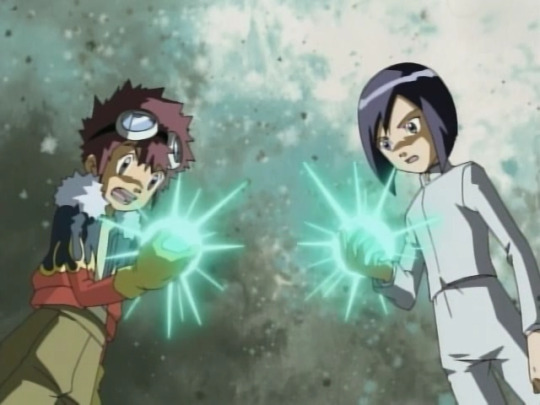
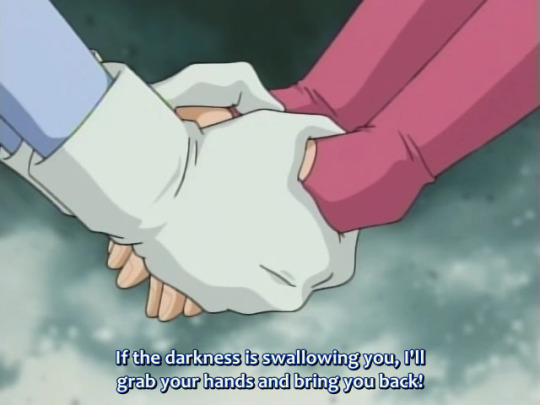
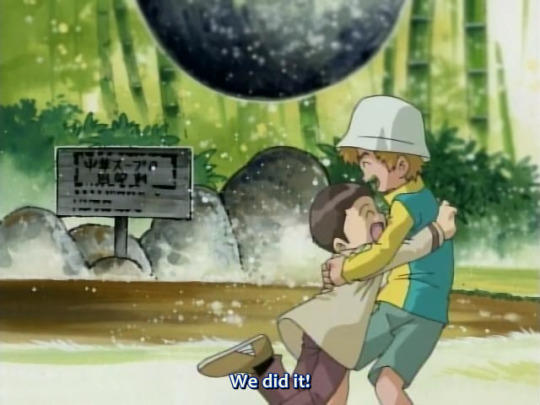
Jogress isn’t just an obligatory evolution gimmick; it’s something very important to 02 as a series and understanding what it wants to say about relationships. I think one thing that makes me very sad is how often its constant pigeonholing as a gimmick makes me hear people saying that Daisuke and Ken was the only plot-relevant one and the rest were forced “spares”, saying that something like Takeru-Hikari and Miyako-Iori would make more sense. But when the point of the series is about building your relationships from scratch and learning to grow together, I really don’t feel that a story about relationships that naturally existed already would have helped it nearly as much. It’s not like Daisuke and Ken was that likely of a friendship, either!
This is especially in the case of Takeru and Hikari, who certainly were vibing pretty well with each other, but were still very emotionally closed-in with a lot of emotional baggage until the more to-the-point Miyako and Iori were able to break through their shells. (02 episode 13 is so often considered a “Takeru and Hikari bonding” episode, but while it does do a lot to show off the depth of their relationship that hadn’t been depicted much besides them just hanging out all the time, it also does not solve Hikari’s core problem in nearly the same way Miyako gets to the bottom of it in episode 31.) This is also why Takeru and Hikari have such a different relationship with the 02 kids compared to theirs with the Adventure kids; while they were largely tagging along with the older kids and learning a bit about inner strength back during their summer adventure, the 02 group is the one who not only provided them with friendship on a more equal peer level, but also poked deeply into their emotional issues that they very much needed others to help them out of. These are friends who finally get them.
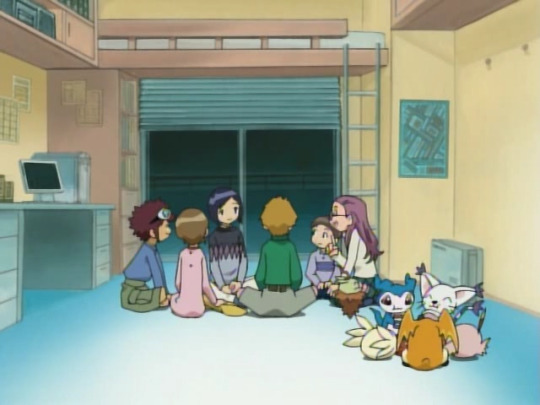
That Ken ultimately becomes yet another addition to this group of kids in need of friends finding support in each other should go without saying -- after all, it’s made abundantly clear he was very lonely and friendless until Daisuke and the others reached out to him -- but it ultimately culminates in them choosing to integrate this lonely boy from Tamachi into their social life. (Remember: Ken is the only of the six 02 kids to live in Tamachi and not Odaiba, but the last quarter of the series has them going out of their way to meet up.) The episode that establishes that everyone has truly made their peace with Ken and wants to unequivocally support him (with the most originally stubborn against it, Iori, graciously accepting him) is sealed off with a Christmas party. A completely ordinary Christmas party that has nothing to do with the Digimon incidents at hand, where they can play meaningless card games and celebrate the little things like Ken laughing, because it’s not just forgiving him or learning to work with him, but actively enjoying his presence and supporting him.
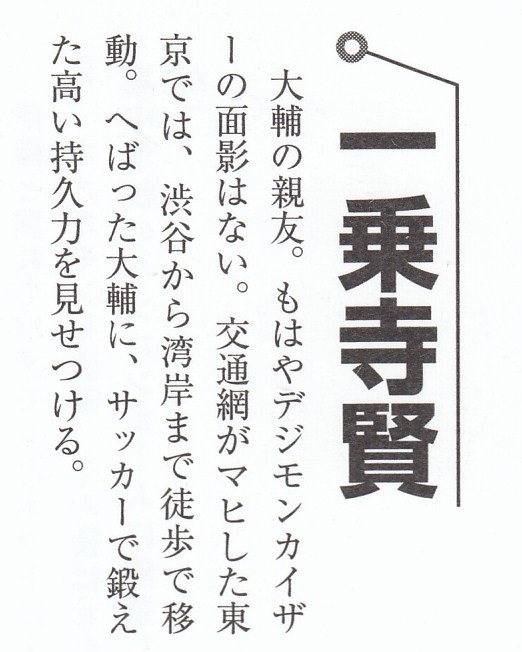
The Digimon Animation Chronicle profile for Ken in Diablomon Strikes Back refers to him as Daisuke’s “best friend” (親友). Usually, the word for “friends” within Adventure and 02 would be nakama (仲間); you may have heard this word from One Piece fans, but this is a word that roughly means “one of us” and has a stronger emphasis on being in a certain group, or being like-minded. Thus, “you’re a Chosen Child like us,” or, more pertinently, “you have the same goal as us and we’re in this together” (after all, it’s not like being a Chosen Child was ever an exclusive club or anything).
But in the case of Daisuke and Ken’s relationship, it’s not just about having happened to gain a deep bond over the course of 02, it’s that Daisuke now really does have a sense of emotional closeness to Ken that the two are considered best friends by default -- in any situation, despite him living all the way in Tamachi. Even though the franchise loves to put them in the category that “protagonists and rivals” usually get, where most others are ones who tend to have friction but understand each other in the end, Daisuke and Ken are unique in that they’re not like that at all. They have a very straightforward sense of emotionally confiding in each other, at worst maybe lightly bantering a bit, but they are friends before anything else, and that extends to the rest of the 02 group as well.
The aftermath
On its face, it sounds like the 02 kids are getting a pretty luxurious deal -- they got a fun adventure of emotional growth out of it, and they’re tight friends with each other at that! Well, that probably sounds great, but there’s a flip side to all of this.
Firstly, as I mentioned earlier, the Adventure kids’ adventure in 1999 was a lot more “romantic” than the 02 kids’ eight-month-long ordeal. Sure, a lot of it definitely was stressful, what with the running for their lives and the scary villains and the emotional conflict, but there was also the part about getting to meet Gennai and the other friendly Digimon around and getting to explore villages. They were on summer break, so they didn’t even really have to worry about school (especially once they realized time dilation was a thing); it’s basically the epitome of the romantic coming-of-age story. (Fun fact: Stand By Me is really culturally influential in Japan.)
02, on the other hand, was an eight-month-long ordeal of having to fight a territory war crammed into the after-hours of school, juggling fighting this war with keeping it from parents, in a fight that would retroactively turn out to be against what would later become a heavily traumatized and beloved friend, plus eventually watching him get subject to even worse trauma. Oh, and the series also ended on witnessing a bunch of deaths (or in other words, the worst New Year’s Eve ever). While it seemed like the kids had the luxury of enjoying the Digital World in ways the Adventure kids couldn’t at first, actually, they didn’t get to enjoy as much of it at all, since they never got to form any lasting relationships with anyone like Gennai or Elecmon. These kids were basically too busy trying to keep each others’ heads on straight to really be able to focus on that.
The comparative mess that the 02 kids went through, and the messes that they kind of are, means that they’re rather dependent on each other for emotional support. This is not inherently a bad thing, mind you; the fact that some people are more independent than others is a simple fact of life, and the 02 kids (whether it’s from naturally being a bit misfit or from the degree of their experiences) being the type who grow together with mutual support isn’t inherently anything bad. It does, however, mean that they’re likely to have some difficulties ahead coming out of 02 as “growing up” conspires to make it more and more difficult for them to stick together -- after all, how many people have actually been able to stick with their elementary school friends all the way into adulthood? This is especially because Japanese high schools admit students by examination, and rank by academic ability; it’s not particularly common for those from the same elementary/middle school to attend the same high school, even if they live close to each other, and it’s very unlikely that all of them will be sticking together in school by that point.
So, how did they fare?
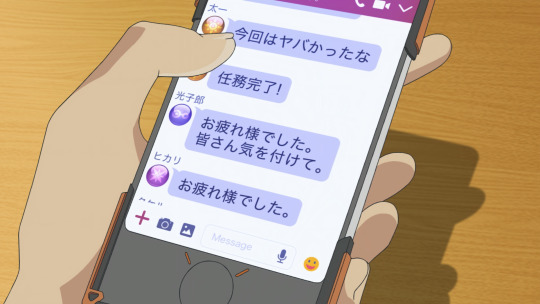
Well, before we get into anything else, we should probably bring up one thing that seems like such a tiny little detail but is actually very important for this: Technology didn’t stagnate at 02′s D-Terminals, and by the time of Kizuna in 2010, smartphones and group chats existed! (Earlier than they did in real life, at that.) This is actually really important because of how much it does for that question of “how to keep in contact when circumstances like school keep you apart” -- especially when the Adventure group would certainly appreciate the method to keep in touch despite their lives largely getting increasingly separate. That, and even more so if other similar technological things like social media existed; there’s a lot of ways to keep in touch despite physical and circumstantial distance.
Of course, they’d been keeping in touch via email since 02, but a group chat is much lower pressure and actively encourages everyone to keep in touch; think about how useful group chats have been for connecting with your own longtime friends. It’s ambiguous whether the 02 group was privy to this particular chat from To Sora given that they were clearly on call for incidents like the Parrotmon one, but it’s also entirely possible that this is a room for The Ones Who Went on That One Adventure in August 1999, especially since they use the Crests as their icons, and the 02 group has their own (let’s be real, they totally would; think about how many Discord servers with overlapping people you might be in right now). This, combined with the fact that the Adventure and 02 groups seem to have formed a sort of recon squad for the increasing number of Digimon incidents in Tokyo, means that there are actually a lot more opportunities to stay involved with each other than ever before!
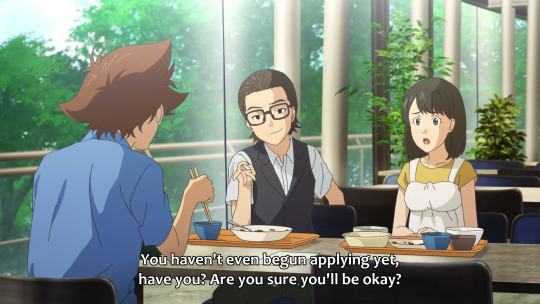


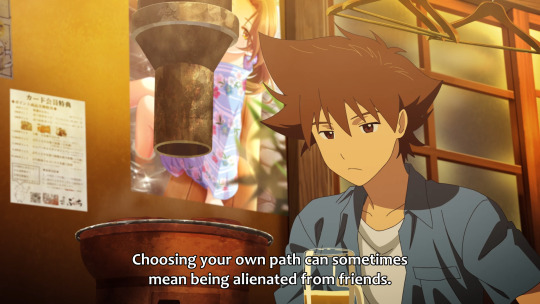
As it seems, the Adventure group does seem to be rather emotionally close to the point that Taichi is willing to reach out to Yamato simply to dump his emotional troubles about his future career prospects on him (despite them going to very different universities at this point). Yet, at the same time, there’s still a palpable sense of distance going on here, and a depiction of Taichi and Yamato having developed separate social lives and their own friend circles -- Taichi with Morikawa and Nemoto, and Yamato with Abe (their names come from the novel), who are also acquainted with each other enough to talk about career and worry about each other.
When Taichi and Yamato talk over beer, they don’t even have updates on the same people (Yamato has to update Taichi on Sora and Takeru’s status), and ultimately, Yamato comments on their drifting -- saying that it’s a potentially inevitable part of choosing one’s path. It’s not hard to see why he says this; it’s been a recurring theme for them since after the events of Adventure. Sora and Mimi haven’t been around for Digimon incidents lately because of their careers, and it’s highly likely Jou hasn’t either; Koushirou keeps in touch, but our only depictions have been in the range of business and Digimon incidents.
But for the 02 group? Absolutely not.

The Kizuna drama CD has a lot about what the 02 group was doing (and planning to do) during their little “vacation” in New York. In fact, there’s a lot to go on about here:
Daisuke and Takeru show up together even though Iori was allegedly said to be “first” approached, meaning the two of them were basically hanging out anyway.
Daisuke insists on going on a trip that’s about his own personal career with friends -- and not just any friends, but specifically the group of himself, Ken, Miyako, Iori, Takeru, and Hikari. He also wanted his seniors along, but they were too busy -- but it’s pointed out that the other 02 group members aren’t exactly full of free time either, meaning that these five have a special place of importance to Daisuke in his ramen career trip.
Even the Digimon are aware of what the other humans (the ones that aren’t even their partners!) have been up to lately.
Miyako and Hawkmon say that it’s only natural for them to show up when the group is getting together -- i.e. being with this specific company is a fact of life to her, to the point she invents D-3 gate exploitation to be with them.
The group keeps saying “it’s been a while” for periods of time in which it is made pretty obvious it’s actually not a lot of time at all. (Miyako had just left for Spain to the point her coming back elicits an “already?!” kind of reaction, yet that constitutes “a while”, and the most likely very short time between the trip planning and the movie is also apparently “a while”, and it’s very likely that Takeru’s “a while” in greeting Iori may well have not been that long, either.) It really makes you think about how often the people in this group must be meeting up to think that this constitutes “a while”...
Hikari is ready to fight people for denying her the chance to play with Miyako.
Beyond that, they’ve all apparently been regular enough presences in Daisuke’s life for completely offhand comments and actions to have major impacts on his career thoughts.
In the movie itself, Miyako refuses to take on the exact same request that she ultimately gladly participates in with the rest of the 02 group in New York -- presumably, because the fact her friends are there makes it all better.
As it turns out, despite everything -- despite everyone going in completely different directions with their careers, attending different schools (Iori’s still in high school while everyone else is in university!), the 02 group has been maintaining this attitude of going out of their way to hang out with each other, in a sort of “we do it together, or we don’t do it at all” sense. Of course, that’s not to say they’ve all stayed so socially maladjusted that they’ve become completely incapable of making any other friends at all, but there is a very clear, strong preference of them wanting to be in each other’s specific company to the point that they would do ridiculous things to make it work.
So, you might be asking: what’s the trade-off?
Yamato attributes the alienation between the Adventure group to “choosing one’s own path”. Inherently, this is not quite right (nor is the sentiment that “choices are bad” in general), especially considering that Daisuke, Iori, and Hikari already made their choices in path a long time ago, yet are still behaving like this. The question is actually more of priorities; notice that while the older Adventure characters are mainly portrayed in Kizuna as aggressively pursuing career prospects, the 02 characters, despite having their current educational statuses listed in their profiles, simply seem to have this as not an object.
Iori’s still in school uniform; he’s arguably cramming this all between school club obligations. Ken, Miyako, Takeru, and Hikari don’t have their current educational status involved at all, and even though Daisuke’s ramen trip is technically for his future career, he’s also happy to just “play around” about sightseeing (and, again, there’s also no reason he needed to bring his friends for this). Takeru’s working on his novel, but he hasn’t actually decided it’ll be his career yet. It’s not about whether they’ve made choices or not; it’s about the fact they’re going about this remarkably casually to the point where maintaining their relationship with their friends is more important than career. And this extends to the 02 epilogue as well; compared to their seniors’ more prominent history-making careers, the 02 group’s is more low-scale and community-oriented (the only exception being Sora, but even that ties into individual ambition more than anything else, considering that not succeeding her mother is already a pretty big deal in itself).
The take-home
Adventure and 02 are both very well-known for showcasing people with different personalities and goals in life, and celebrating their differences. I think, personally, the difference between the Adventure and 02 groups’ dynamics is also something that reflects on the different ways to live one’s life as well. This is especially something that most of us can probably understand well now that we’re adults looking back at this, especially in light of Kizuna.
There are some of us who really want to do large-scale things in this world, and will need that understanding of the self to get there but may struggle with maintaining consistent friendships on that turbulent path, and have to adapt by managing the different levels of their relationships and learning to get along with different people in different ways. There are some of us who gain happiness more from mutual support with the people around us even if it means not ostensibly achieving as “great” things, and feel most comfortable with a single consistent set of friends. Some of us are in between, or feel elements of both as we try to experiment with things in life (actually, I’m pretty sure that’s probably most of us to some degree).
Think about your own life and future prospects right now, and then think about the friends you may be in touch with, or haven’t been in touch with for a while, or the ones you talk to for different purposes or fulfill different niches in your life. We’re all trying to straddle this balance; there’s no one right way to live.
#digimon#digimon adventure#digimon adventure 02#digimon adventure last evolution kizuna#kizuna spoilers
184 notes
·
View notes
Note
Hi...how are you? If you don't mind me asking who are your favorite siblings' relationship in anime/movies/tv series? Sorry if you've answered this question before......
Hello!
Here is my list in no particular order.
1) Nina and Johan (Monster)

Their relationship is very interesting and complicated and it basically deconstructs the bond between twins and the trope of the good twin and evil twin (which is what makes it acceptable for my friend @hamliet <3<3<3).
The two twins were never treated as children and as a result they developed an extremely frail sense of self and kind of a symbiotic relationship. In particular, Johan decided to become Nina’s coping mechanism, a sort of living Jungian Shadow of her. The result is a disaster and the two siblings ended up hurting each other.
Still, their recovery goes through uncovering their shared past and the past they do not share. It is a path of self-discovery and forgiveness.
2) Zuko and Azula (ATLA)
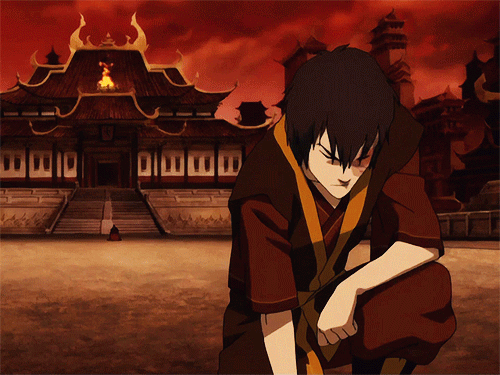
Theirs is a tragic bond. They are two abused children who turn into two troubled teenagers. They are pitted one against the other by their abuser and in the end they are not able to overcome how their upgringing has shaped their relationship (at least in the show proper).
They are also two different answers to abuse and even if just Zuko is able to change for the better, Azula is still shown empathy.
In particular, they have opposite problems when it comes to their feelings. Zuko’s feelings explode and this is why he lacks control of his fire. Azula instead represses all her feelings to have perfect control. However, in the end it is necessary to aknowledge one’s emotions and to face them to truly reach harmony.
3) Soren and Claudia (The Dragon Prince)

In my opinion, Soren and Claudia (together with their father Viren) are the two best written characters in the series (as for now) and the main reason I got invested in it.
Soren and Claudia’s bond is one of mutual affection and trust. However, it is being challenged by the toxic influence their father has on both. They both risk to lose themselves to the flaws they very clearly inherited from Viren. Moreover, their different reactions to their father’s spiral has created a rift between them.
I love how they are both shown at their best and at their lowest points because of that same trait that, if well balanced can save them. Soren risks to lose himself to the desire to prove he is a good royal guard. Still, later on is that same desire that leads him to make the right thing. Claudia is his inversion. She is shown doing the right thing out of love, but then she spirals for that same love.
Still, I think that in the end they will be there for each other.
4) Krel and Aja (Tales of Arcadia)
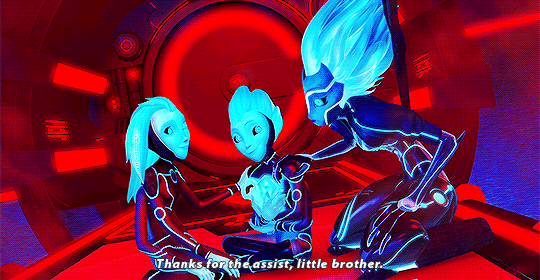
Krel and Aja’s arcs are powerful and complementary. They both start thinking they are meant to be what the other will become in the end.
Krel starts as more responsible towards his role as Prince and shows disdain and discrimination towards Earthlings.
Aja initially wants to run away from her role and enjoys her normal life on Earth.
However, by the end Krel is the one who discovers himself through his relationships on Earth, while Aja finds herself a queen.
It is this paralleled and inverted structure together with the siblings’ complementarity and the strong bond they share that make them such good protagonists.
5) Hargreeves siblings (The Umbrella Academy)
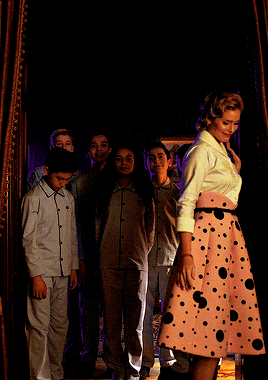
They are all disasters and this is why their family is the best.
I love how after years spent avoiding each other, they still very clearly love each other and see each other as family. Despite being already adults, they are all still children when the story begins and they need to face each other to heal and truly grow.
I also like how each sibling has their own well defined personality and how each bond is different.
Luther and Diego have a rivalry.
Allison is everyone’s big sis and Luther’s love interest.
Vanya is estranged from everyone, but she develops a strong bond with Allison and is shown to get along with Five.
Five adores all his siblings, but often does not care for their individual needs.
Klaus is loved, but also underestimated by the others and he shares a special bond with Ben.
All in all, the family dynamic is very well flashed out and I think this is why the show works so well.
6) Zoldyck siiblings (HxH)
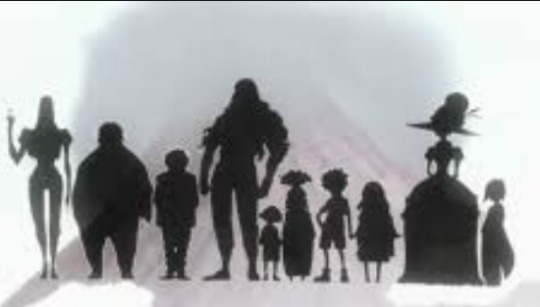
I love love love the Zoldyck Family and I love how all the other four siblings clearly foil Killua aka one of the MC. His two older brothers are who Killua must not become (an assassin like Illumi or dependent and unable to leave home like Milluki). Kalluto and Alluka are instead who Killua needs to save from the family. At the same time, Alluka, Kalluto, Milluki and Illumi all foil each other or have the potential to do so. They are all pretty different people and their dynamics are dysfunctional, but also entertaining to watch.
7) Schneeblings (RWBY)


This trio’s dynamic might be less central to their series than the other examples. Still, they are all pretty flashed out and their interactions are funny to watch.
The Schnee siblings have all reacted differently to their abusive environment. Still, they all share a warm heart behind a cold exterior. It is telling that they all work together to save Atlas and it is telling they all break free from their abusive home life also because of the others.
Winter inspires Weiss to leave and Weiss inspires Whitley to use his power for good. They make a virtuous chain of sibling love.
8) Kirishima siblings (TG)
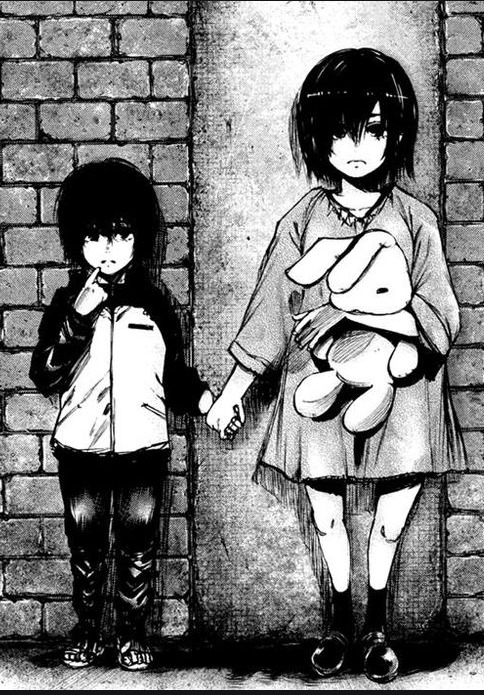
Ayato and Touka’s backstory is one of my favourite parts of TG. It is interesting to see how they both changed in ways that turned them into their antithesis, but that are also consistent with the personalities they show as small children.
It is heartbreaking to see how close they were as children and how much they have grown apart as teenagers. Still, their bond remains strong and they still clearly love each other. Touka used to protect Ayato as a child and Ayato is trying to protect Touka now that he has grown. Still, he goes at it in the worst way possible.
SPECIAL MENTION: The Gandor brothers (Claire included) from Baccano! I just love how surreal their interactions are!
Thank you for the ask!
#nina forner#johan liebert#azula#zuko#soren tdp#claudia tdp#krel tarron#aja tarron#hargreeves siblings#zoldyck family#schneeblings#ayato kirishima#touka kirishima#thanad-zid#asksfullofsugar#chain of faves#gandor brothers#claire stanfield
92 notes
·
View notes
Note
why is Iroh wrong to consider Azula dangerous? She tried to murder Zuko and seriously injured both Iroh and Zuko
Hi, I’m just gonna assume you’re genuinely wondering about my opinion instead of trying to be rude so here you go. (also sorry about the late response)
First off, Azula is dangerous. But the way to treat a violent patient isn’t by responding with more violence.
Also- it isn’t wrong for Azula to be violent. It’s not just her personality- it’s a trauma response. There are really two main ways that children can respond to trauma in an abusive household (which hers clearly was.) you can be unable to adapt to your environment, triggering the adult more and more, unable to comprehend what’s happening. This is 100% Zuko. He’s also not stupid for any of this. Not being able to understand why your parent is abusing you or even understanding that you’re being abused doesn’t make you stupid. The other main response is adapt and survive. We also see this from Mako, but we mainly see it with Azula. She is not a psychopath, we see in her breakdown, that all she wants is for someone to care for her. Her entire life, Ozai told her that violence and fear are the only ways to be powerful and being the favorite child, there were more pressures on her than Zuko. In her breakdown, she realizes that in the end she has no one who cared for her. Even her own father, who bred her just to be like him, ditched her the first chance he got. I’m not condoning her actions, but I do understand them.
Also, I don’t know who needs to hear this but IT IS NOT ON THE CHILD TO BUILD OR FIX THEIR RELATIONSHIP WITH THEIR PARENT OR GUARDIAN. Maybe Iroh couldn’t have taken her with him, but we see that he hasn’t spoken to her in YEARS. We are supposed to root for the man that left this girl alone with Ozai without a second thought? Hell no.
We also see that Azula already doesn’t like her uncle and, honestly, I don’t blame her. If my brother got a priceless knife for a present, I’d also be pissed that I got a cheap doll. We don’t see them ever interact with each other in the palace. Once again, it was not Azula’s job to fix her relationship with Iroh. Instead, he left her too without so much as writing to her.
Not only that- but he also convinces Zuko that he has to hate her too! When they first escape Azula, Zuko says he knows he should be nicer to her even after she tried to imprison him. Instead of agreeing Iroh says ‘Oh no she’s crazy and needs to go down.’ in what world is that ever okay to say about your 14 year old niece??? He encourages Zuko time and time again that she is not worthy of redemption by emphasizing the fact that she’s terrible and crazy and zuko needs to be the one to finish her off. It would be different if he told Zuko that he would have to fight his sister in a solemn tone, but he doesn’t.
Let’s say that Iroh had to leave her behind. He had to never write to her. Had to tell Zuko that she was crazy. Had to convince him to fight her. Had to tell Zuko that he would need to face her. All of this would have been better if he had simply been remorseful or regretted anything. But he didn’t regret anything.
We see Iroh as a hero because he was on the good side in the end. He did help Zuko become a better person and he led the reconquering of Ba Sing Se. But, if you actually look at his individual actions and not his arc as a whole, he’s not as good a character as we make him out to be. He is not wrong to think that Azula is violent in the end, because she was. Again, the response to a violent patient is not violence. There is a reason that we don’t do things like have patients wear straight jackets anymore. All it does is cause more outbursts. She also wouldn't have been violent if Iroh had shown her the same love he showed Zuko. No child is irredeemable.
Long story short, it’s not Azula’s fault for not being a ‘good victim’ and resorting to violence. It is Iroh’s fault (and her mother’s from what we’ve seen but Ursa can be tricky) that she knows nothing but violence and fighting. Instead of simply caring for her, Iroh leaves Azula behind because she’s not Zuko.
167 notes
·
View notes
Text
BBC's Merlin Season 1 Episode 1: The Dragon's Call Analysis
*SPOILERS- FOR THE WHOLE SHOW*
So I just re-watched episode 1 of Merlin, The Dragon's Call and I thought I'd post my thoughts here, since this is the kind of thing I always wanted after I watched Merlin for the first time. Sorry, it's quite long!!
This episode is great fun to watch but also really interesting from a thematic perspective, as it introduces all the key characters and many key themes that continue throughout the show.
Setting it up as subverting traditional telling's of the legend
The wonderful thing about Arthurian legend is how many ways you can tell it, there is very little canon, it's whole point is that it has been reinterpreted time and again to say different things, be that as it may there are traditional elements which tend to remain constant and Merlin keeps some of these but many it takes out and it sets that up here.
The introduction is like a fairytale, "the young warlock arriving at the gates of Camelot", feels very much like the introduction to a fairy tale. This is on one hand telling us that this is a story we know like any fairytale, but the very fact that Merlin is young shows us that it is going to be different.
On the side, I love the line "A boy that will in time father a legend", because there's just this wonderful gap between the audience and the characters (as there is throughout the whole story), we know that Merlin will do great things, we know that Arthur will too, they are stories we have heard (tying again into that fairytale esque introduction), and its wonderful to know that, to see Merlin and know that he is destined for greatness.
Introduction to characters:
I haven't got a specific section for Merlin here, but its sort of strewn throughout everyone elses.
Morgana:
If you know Arthurian legend you will know that in many (even most) versions of the story Morgana is a villain, so her introduction here is both scary and fascinating. She is so clearly not a villain, and you wonder (if Merlin stays true to this element) what is going to change and happen that she will become one. I knew from the start that Morgana would become a villain (I had heard a lot of spoilers), so it was especially tragic and interesting to watch her character arc because I always knew. Interestingly she is immediately set up in alliance with Merlin, even though they barely interact. We know that he is a sorcerer, and her first lines are oppositional to Uther's stance on magic, she out of everyone in Camelot seems the most likely ally. This is the start of what becomes parallel character arcs, Morgana and Merlin are both fighting for magic to become legal but they end up going about it in different ways, and one is the main villain, the other our hero. They are the same and yet opposites, and the setting up starts from here.
Arthur:
Arthur appears quite simply to be a spoiled bully, not exactly what we expect from the King Arthur we know and love. The position he starts in though is important for a key element of the story which is Merlin and Arthur creating a better world in many ways directly oppositional to Uther's teachings, based on love, kindness, willingness to put others first and respect for others. Uther's world is one where strength is rewarded and he is (in a more adult way than Arthur) a bully, as we learn later he is someone who takes his anger and fear out on others, who takes advantage of his position to hurt people even those he loves. Uther can be a good king, but not when it asks him to make sacrifices of his worldview or things that really matter to him. Uther teaches Arthur some important things but there are many things Arthur has to unlearn, and these bullish tendencies, and lack of respect for others inherent in them are one of them. We do however see Arthur's inherent nobility and goodness in this episode. When he lets Merlin go because even though he's an idiot "he's a brave one", it shows us how Arthur respects what people do rather than who they are. Uther wouldn't of let Merlin go (though to be fair Uther probably wouldn't of picked a fight with a peasant), he would have thought that the law had to be upheld no matter the individual circumstance. Merlin attacked the prince that is definitely illegal but Arthur respects his courage (even though it came at the cost of his humiliation), and there is something different to Uther in that, even good.
Merlin and Arthur:
This episode aside from setting the tone for the more hilarious aspects of Merlin and Arthur's relationship establishes some other interesting things about what they are going to be to each other in this version of the story. Traditionally Merlin is Arthur's teacher, often tutoring him as a child, obviously this doesn't happen here but they retain that element of teaching here. Kilgharrah literally says that maybe it is Merlin's job to change the fact that Arthur's an idiot. Merlin challenges Arthur from the start, willing to criticise him and treat him as an equal (which Arthur actually appears to love), and we see perhaps what Merlin is going to teach Arthur and the more noble elements of Arthur's character that Merlin's going to bring. It is also only within the context of his interactions with Merlin that we see Arthur's best side (at least in this episode). Merlin shows Arthur that he has to treat all people with respect, Arthur recognises that Merlin is brave and full of qualities that Arthur himself admires. When Merlin saves Arthur's life you can see Arthur re-evaluating everything he thought he knew about him, there is a respect there.
Arthur's Mum Igraine
She's not a big part of this episode but she was mentioned and I think its interesting how she's represented. In many ways her representation is highly simplistic, she falls to the fate of many fairy tale mothers in being dead before the story begins, she's a plot device. She is presented (not outright but implied) with all the stereotypical virtues mothers are ascribed with, the woman who's trying to kill Arthur this episode talks to Uther about how hard it must have been for Arthur to grow up without a mother. It's not a huge scene but its an insight into Arthur's character, he was brought up with all the hate and bullishness of Uther without a mother who could have taught him love and kindness. As we later learn Igraine's death triggered the great purge, her loss very much symbolises the loss of love within the kingdom, both in what Arthur's like at the beginning as well as what Camelot has become under Uther's leadership.
Gwen (and Merlin):
She is wonderful and sweet and interestingly (especially for an audience that knows Arthur is going to marry her one day) a servant. It is interesting that the two people who become in the show (and we know as an audience will one day be) closest to Arthur are servants.
The thing about Arthurian legend is that typically its very much set within a context of Medieval feudalism, which means stringent social barriers. The code of equality inherent in the idea of a Round Table is equality among nobles, the code of chivalry is a code of honour for knights not for ordinary people. It's a reflection of the social realities of the era that inspires much of the aesthetic of Arthurian legend as well as the era in which most key tenants of the legend were formed. In making Merlin (Arthur's teacher & (in this show) best friend/soulmate) and Guinevere (Arthur's wife) servants, this show is changing this idea for one more reflective of our own times. It is about absolute equality of all people, and as I've said already the inherent value that every single human being has and the individual capabilities for nobility and goodness and everything the Knights Code admires. It thus sets the tone for what Arthur is going to represent, not just the ideal of knighthood and courage but the ideal of kingship for all people and the ideal of the world that matters to every person.
The self reproducing nature of love and hate
This is an idea which I've always viewed as the main theme of Merlin, the idea that hate begets itself, as does love. This episode is a perfect encapsulation of that theme which recurs again and again. Uther kills a man who is innocent (in the sense that he didn't actually hurt anybody) and the man's mother seeks vengeance and in doing so kills more innocent people because she hates Uther enough that she doesn't care who else she hurts to get at him. This happens again and again in the show, but what this show does that I love is turn it into a main theme by depicting the reverse. Arthur and Merlin are great because they act against this world of Uther's creation, they act with love and compassion and respect for all people, the ends rarely justify the means and most importantly, especially when their actions seem morally grey, they are always motivated by their love for others (not fear or hate- unlike Uther and any number of villains). Uther is the main villain of the show precisely because it is his actions that create every other villain they encounter, Morgana sums it up nicely and somewhat ominously (given what side she ends up on)- "the more brutal you are the more enemies you'll create". Uther views that brutality as strength, but it is the weakness at the heart of his kingdom, it is what makes Camelot a worse place it is what puts everyone he cares about in danger. Essentially the plot of the first episode sets up the cycle of violence that Uther started, though it doesn't set up Merlin and Arthur as breaking it it does set up the idea of equality and respect for all people that Arthur will learn and is essentially opposed to the brutality and cruelty and hate represented by Uther.
Fun non-analysis things
It mightn't seem like it but I do actually watch Merlin for reasons other than copious analysis of themes. It is a highly enjoyable show with characters and relationships (Merthur but also just generally the wonderful representation of friendship and loyalty) I love, and its actually really funny.
Gwen saying "Who'd want to marry Arthur" is peak comedy because we all know, well you.
The weird set up in Gaius' first scene as him being bumbling and slightly insane (in the mad wise old man sort of way), there is literally no carry through, he's not even like this in the rest of the episode, but its hilarious so who cares.
Merlin and Arthur's whole exchange is the funniest thing and Arthur had every insult coming. Also this is exactly how you set up enemies to lovers.
All the writers names begin with J? It's just something I notice every time the intro credits roll and it's just funny (Julian Murphy, Johnny Capps, Jake Michie and Julian Jones)- also two Julian's, I mean what are the chances?
#bbc merlin#merlin bbc#merlin#king arthur#arthurian retelling#arthurian legend#morgan le fay#morgana pendragon#guinevere#gwen pendragon#uther pendragon#love and hate#merlin analysis#merlin duty#merlin goodness#Igraine#the adventures of merlin#bbc arthur#emrys
31 notes
·
View notes